#i love all these villains in their states pre batman and like
Explore tagged Tumblr posts
Text
Also tbh arkham origins is like the other half of arkham city. In all the ways arkham city is a fantastic sequel to asylum, arkham origins is a FANTASTIC prequel. just. The setup and way they approach the themes is so good
#Shitpost#VERY impressed. Was not expecting to get this into it ngl!#i wasnt sure if it could impress me!#The first half fell into my expectations#it was fun but didnt make many moves i got super into.#then oh!!! Okay!!! Gotcha!#it handled liklik#The main story here was really good#ive done most sidequests but not all. Almost done with riddler stuff#not sure how much challenge stuff ill do#okay also sidenote but i love how riddlers character is. Hes so different#i love all these villains in their states pre batman and like#wow riddler is sane and has his own morality and goals#the batman is annoying tf outta him#riddler and joker both go insane and end up focusing so much on batman because of him#its interesting to see them right before that obsession sets in#jokers critical point is ingame ofc#i assume riddlers is as well but im not quite there yet
1 note
·
View note
Text
THAT'S IT! This is a Janet Drake Defense Post
As may be obvious, I spend a lot of time reading fanfic. And there's this trend that drives me nuts, and it's villainizing Janet Drake.
I'm not gonna say she's an A+ mother. She's not. She chose her career and adventures over spending time with her child much of the time. But fandom portrays her as some rich pompous ice queen, which is never shown.
Janet Drake mostly appears in the story Tim's introduced, and in the story she dies.
So, let's start from the top: Haly's Circus.
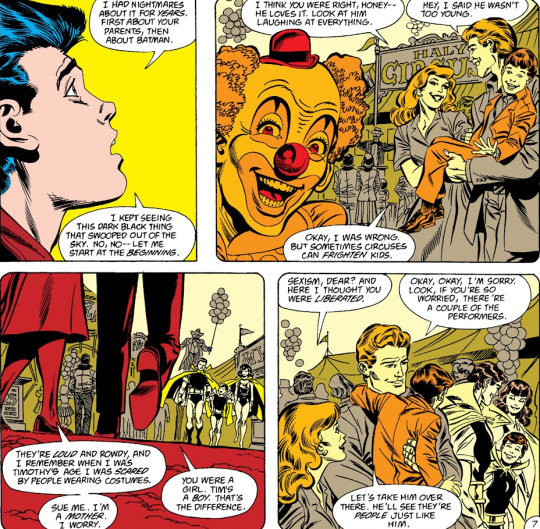
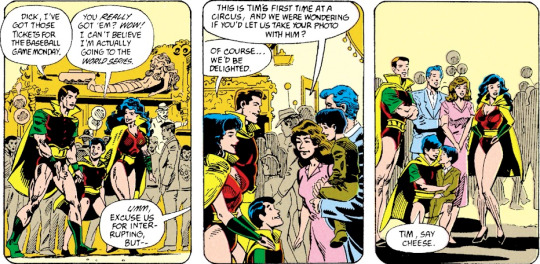
This event is the only time we see her really interacting with Tim before her death, but it shows that at least when he was young, she was an active part of his life. She was worried about bringing Tim because it might scare him. And then rightfully scolds her husband for being sexist because Jack Drake actually IS a jerk.
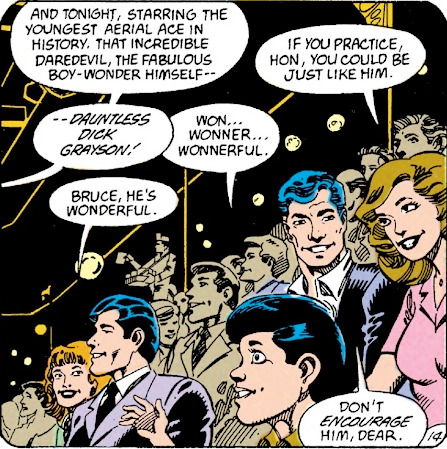
...I don't like the art in this comic. Or that the writer doesn't know how kids speak.
But Janet is being supportive of Tim's clear interest in Dick's performance.
And then tragedy strikes and she acts like, y'know, a mother.
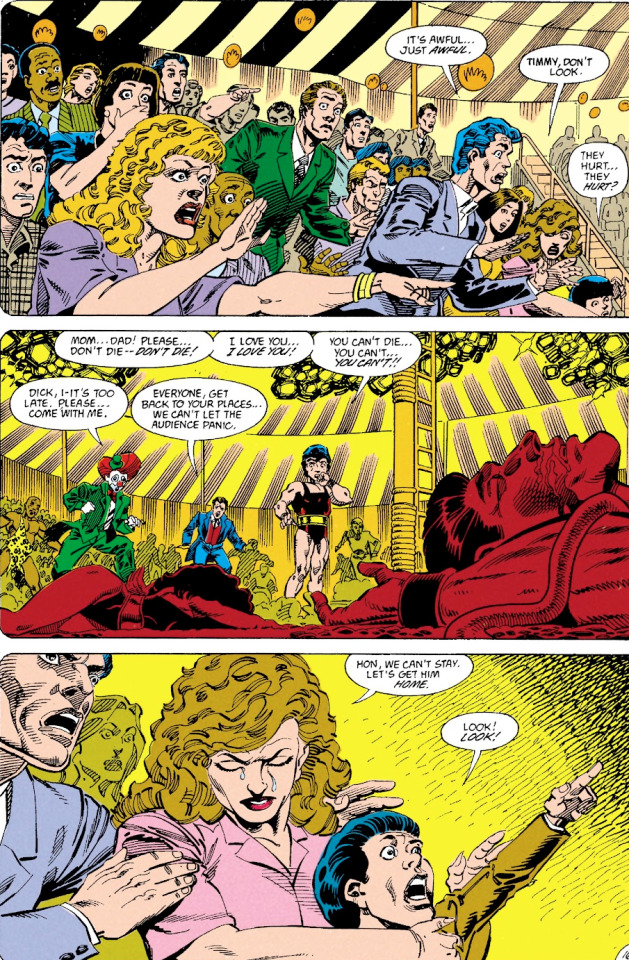
Her priority is getting her son and herself out of there.
Also worth noting that the Drakes sent a copy of that final photo of the Graysons TO Dick, which is how he has it at all. If both of them were stuck up pricks, would they even bother sending a photo to a grieving child performer they hardly know? I can't imagine Jack really bothering, but I don't see why Janet wouldn't.
And then, by the time she's dying, we know that Tim's parents have been away for a very long time, he never knows where they are, but they've communicated enough that he knows that they've been fighting.
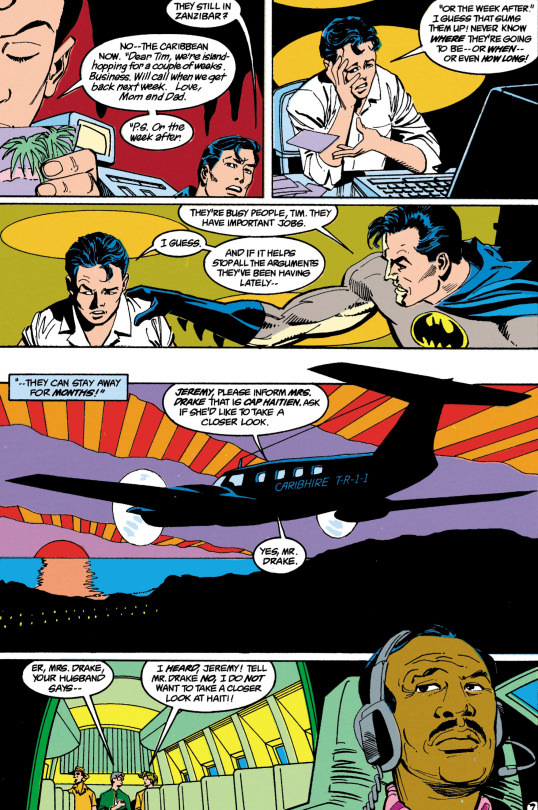
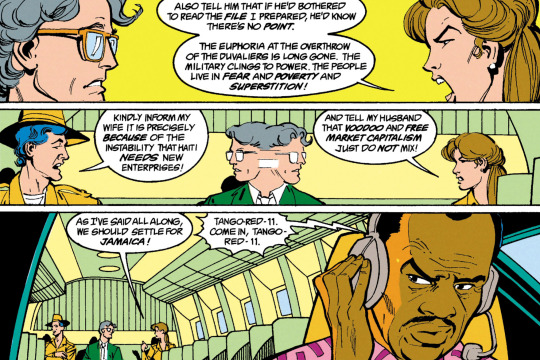
They're passive aggressive to say the least. This marriage is clearly not working anymore.
EDIT CUZ I REMEMBERED A THING:
It's worth noting that this is a time before smartphones. This comic was released in 1990, which was when pre-paid mobile phones had just started existing. Coverage isn't universal NOW, so back then it was even less, and Jack and Janet are archeologists (or archeologist adjacent?) so they're going to be in less developed and populated areas most of the time. It's unlikely they'd have consistent access to a functional phone that could call the states to talk to Tim regularly.
This isn't to defend their absence, because fuck that, but it's to give it some context. I don't think they were trying to ignore or abandon Tim. Communication was just not readily available and Janet seems to get wrapped up in work...and Jack's an asshole.
Also for note, Janet is probably the one sending Tim postcards in the first place. It being signed "Mom and Dad" is what makes me think that. Jack would have put himself first if he wrote it, it woulda said "Dad and Mom". That's admittedly pure speculation, BUT IT FITS SOOOOOO
My thought is if this were made modern, Janet would be sending extremely scattered texts and Tim would get next to nothing from Jack unless Janet prompted him.
END EDIT
(Fair warning, this story is a few levels of Yikes, but I'm gonna stay on topic)
Bad guy Obeah Man does...something? to the pilot, and they crash, and he has a group of people kidnap the Drakes and their assistant Jeremy.
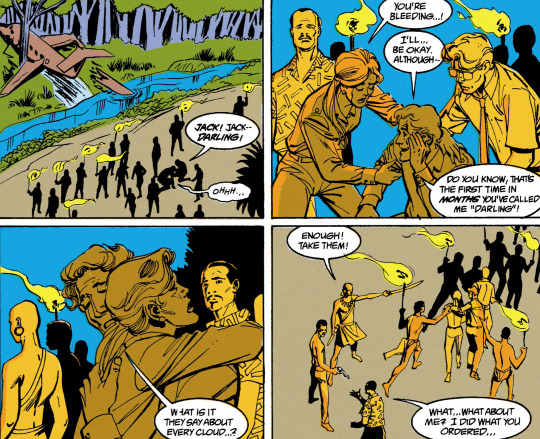
Danger really puts some things in perspective, for Janet, at least. And that continues for her. Jack is a bit delusional and in denial, thinking he has any control of the situation.
They are tied up and filmed for ransom, their assistant killed right in front of them.
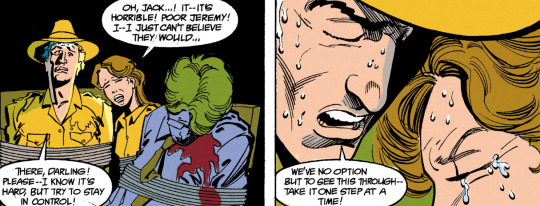
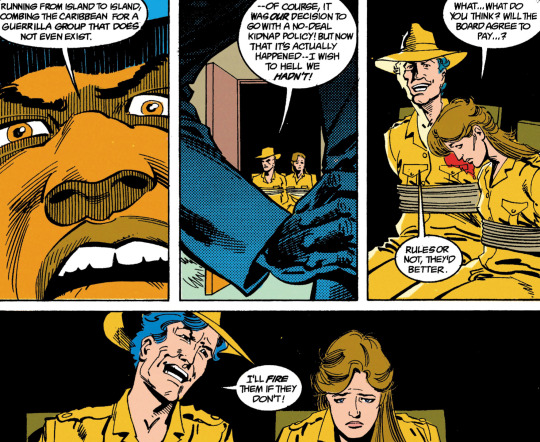
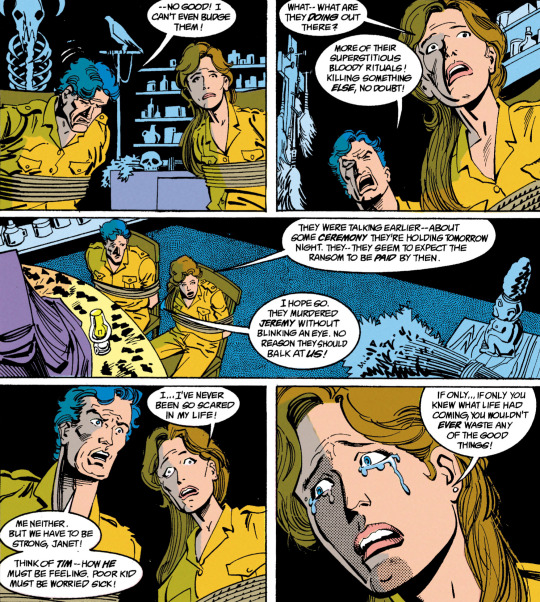
Jack just keeps raging, but Janet is having regrets. Notice how she doesn't cry until Tim is brought up. Could be nothing, could be something.
And then she dies.
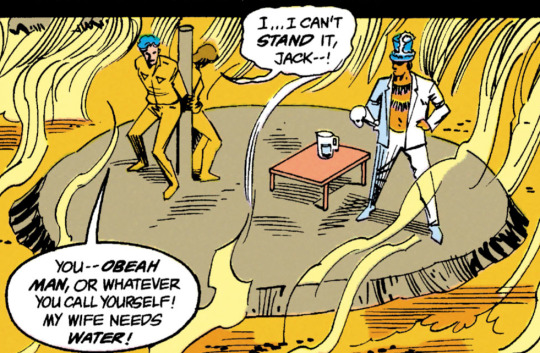
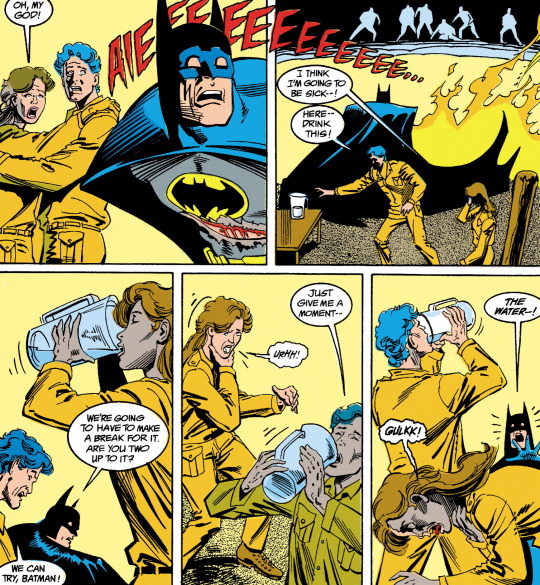
Her only other major appearance is when Tim is having a fever dream from the Clench and everything is kind of okay for a minute.
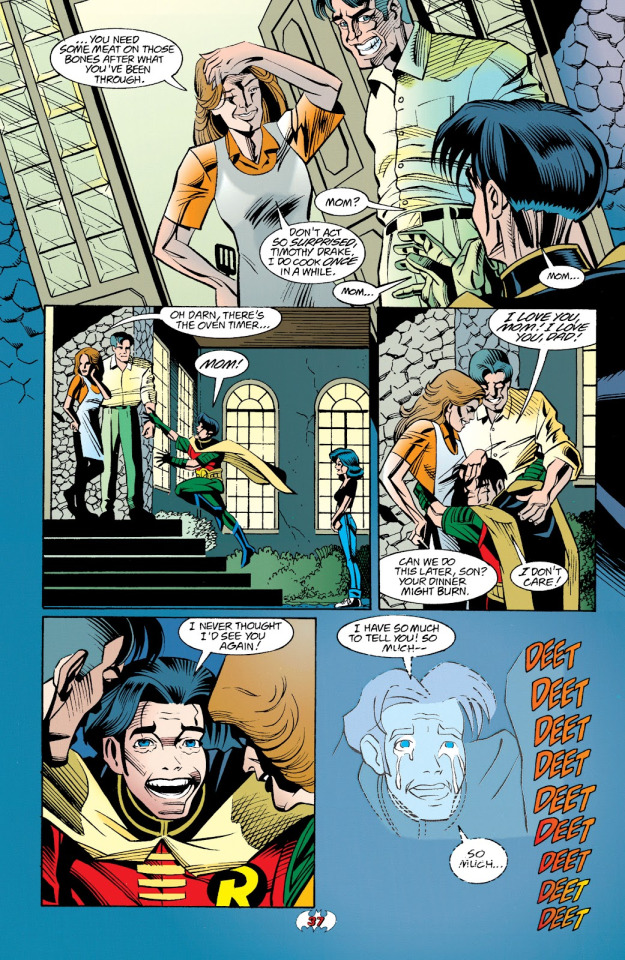
Tim very clearly loves his mom. And we may not get a lot of characterization for her, but she's not cold or callous like people write her constantly.
And now, we finally have a little more about her as of Batman 134.
I haven't really been keeping up since the Gotham War stuff because What The Fuck Was That My Guy, but I recently saw this specific comic.
The multiverse is fucked up again, some way some how, and Bruce is lost (again) and Tim has to get him back (again). This time, Tim is going in after him. But he doesn't end up going straight to Bruce.
He goes to see an alt of his mom.
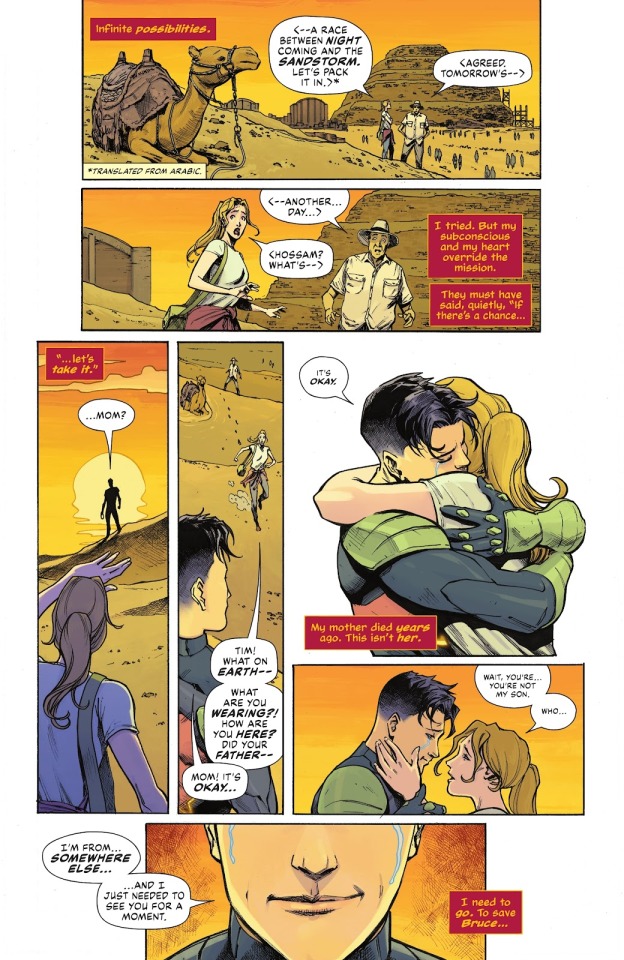
Tim missed her so much that he ended up going to her before Bruce.
And her immediate reaction is to run up and hug him. Does that look like a mother who doesn't love her son?
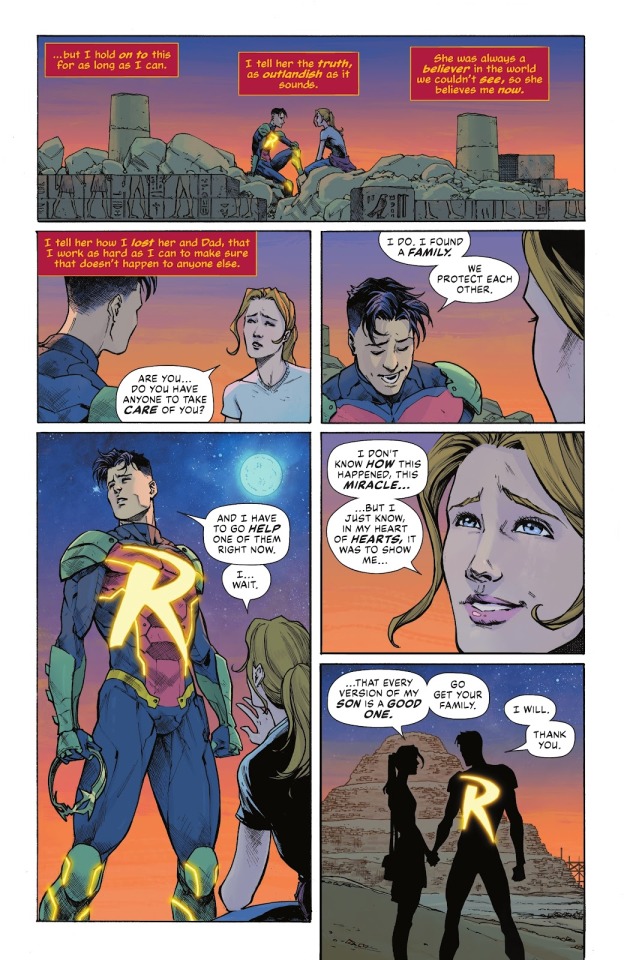
"Do you have anyone to take care of you?"
"I don't know how this happened, this miracle...but I just know, in my heart of hearts, it was to show me...that every version of my son is a good one."
Tell me again that this woman is heartless and didn't want her son, I fucking dare you.
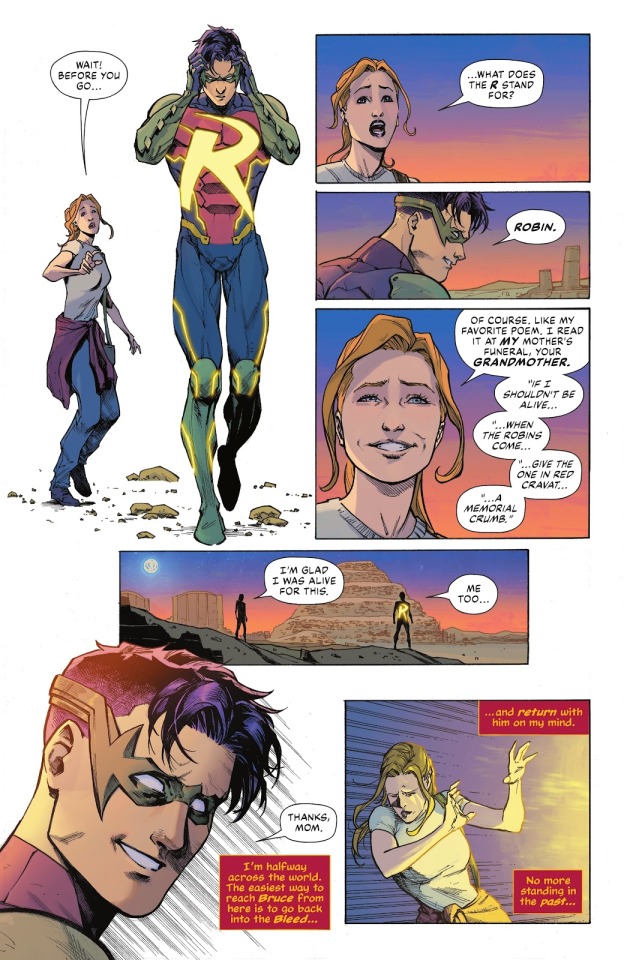
And we get more meaning to the name "Robin" and a little crumb about Tim's grandmother. As a treat.
This is all to say, please stop writing Janet Drake as a cold, heartless bitch.
Small final note though: Jack Drake is, in fact, a shitty person and a shitty father. He does still love Tim and Tim loves him AND THAT IS NOT UP FOR DEBATE, but the relationship is a mess. If either parent is actively abusive, it's 1000% Jack "smashed a TV because my son wasn't listening to me and threatened Bruce Wayne at gunpoint" Drake. Probably part of why the marriage was falling apart.
Anyway, yeah, let's retire the "Jack and Janet Drake are Bad Parents" tag and replace it with "Jack Drake is a Bad Parent" and "Janet Drake's C+ Parenting" or something.
221 notes
·
View notes
Text
What's funny about Batcest defenders is they use the 'historical accuracy' excuse but Batcest hasn't actually had any longlasting,overt effect on Batlore or irl movements and thus is not a cultural aspect,neither to comics culture nor any other kinds of cultures.'Older gays thought of Robin and Batman as a gay metaphor in the early Batman comics days' is the one you'll hear the most but this was never a plot point in said runs and Bruce and Dick were established as having a mix between a brotherly bond and a father and son relathionship ever since Dick's debut issue and they were never written with anything but familial ties in mind and given no gay-coding that implied attraction to eachother specifically.Yes,Batman as a franchise frequently plays into camp but this was moreso in Bruce's gender presentation and mannerisms and interactions with his fellow male adult heroes and his villains like Clark and Harvey than anything to do with Dick.At the time these allegations were thrown,the awareness of children's rights and by extension what did and didn't count as child abuse was extremely low and inclined in favor of normalizing the latter due to the ageist dehumanization of kids and if you're going to include older gays' opinions on this,it's only fair you listen the younger gays of the time too lest you fall under the same ageist rethoric that got them abused-Or more specifically groomed,as what a romance within 'Batman and Robin' inherently is
It took literal decades for Batman and Robin to actually be written as a canon ship and the writer in question was ragingly racist at the time who very purposely employed romani heritage into the previously white Nightwing specifically to fetishize him further but has since apologized for this as well as her Batcest canonization,stating she was trying to cope with her own incestous csa trauma but went about it the wrong way.Tim/Cass was only canon pre-Cass adoption and discarded when the writers finalized they're decision to make Cass Bruce's adoptive daughter,Jason/Dick/Tim in any combo has zero canon depicitions despite there popularity,the closest thing to Damian Batcest is him brefriending a deaged Cass in the Harley Quinn 2019 comics but even then we're not truly given anything beyond friendship with them and Duke as an official Batkid has far more pagetime and grounding than any Batcest ship.And yet........So many Batcest shippers defend the erasure of the first ever black Robin,a legitamely revolutionary and major Bat-Addition and Batfact that is treated as such in-universe by the narrative(and by Jason 'I see a black boy and imma ride with and for him typa beat' Todd)and out of universe by black DC fans,as if the words of 'queer elders' they never met and were dangerously very possibly actual en masse pedophiles are more important to them that of black Batfans who exist with them,us and you today
If you were to bring up the Batfam to someone irl,their first thought would be 'Oh,it's Batman and his kids!!!',not to start talking about ships of them.In my experience,through cultural osmosis most people who don't read comics already know The Batkids are siblings and are puzzled,shocked and disgusted when they find out people ship them.Batman and Robin/Batgirl are not known as an 'otp' but as a dad and son/daughter duo almost universally even to non-superhero fans and it's pretty widely aknowledged in the case of Batgirl specifically they're a bad ship that ruins her character by reducing her down to a love interest for an older man according to those who've only watched animated adaptions and most of all by those who're heavily invested in Babs as a character i.e dedicated enough to read her comics.It's almost like.......Batcest is a defect,not a feature,and only comes along when bad writing strikes.........and is fueled by bigotry rather than queerness as seen by the racism in it's first insertion,the misogyny in the cishet versions and the antiblackness by the posers in the fandom..........and that trying to prove it as 'historically accurate' is something only done by chronically online predominantly white gooners with intersectionality issues who use gaslighting as their tactic...........Who woulda thunk incest wasn't actually an intentional element in a mantle created to be an escapist fantasy for children first and foremost,which is a legit kept historical part of it as seen by DC refusing to let anybody who's 18 or over hold it to the point of keeping Tim eternally 17........That's crazyyyyyy
#anti batcest#batfanon slander#batfam#bruce wayne#dick grayson#jason todd#tim drake#cassandra cain#duke thomas#barbara gordon#good dad bruce wayne#afrolatino jason supremacy#arab damian wayne#chinese damian wayne#duke is a robin#duke is a batboy#trans 4 trans and autistic 4 autistic found family realness#incest cw#anti incest#pedophillia cw#child molestation cw#grooming cw#summerposting#devin grayson#bigotry
24 notes
·
View notes
Text
Wonder Woman: Dead Earth
Spoilers
The good: I liked the way this story was executed. Diana's characterization initially was very good: she's merciful, compassionate, loving. Art's good, plot is well-paced, they go pretty deep into Amazon lore instead of a more general DCU stuff--there's no other superheroes aside from Superman and Batman. I liked the new origin DWJ came up for Diana, which adds a Prometheus twist to Diana's existence which for me played well better than "she's Zeus's daughter" and dare I say improves on Perez's girlpower origin.
The bad: I'm so conflicted on how the story develops, because it gets very Zach Snyder. Diana turns out to be eminently corrupt, guilt-ridden, and brooding. The Amazons themselves are massively villainous. Wondy herself is largely responsible for destroying the world. Yeah, there are extenuating circumstances and sympathetic reasons--Diana going bee-zerk with her bracelets removed makes a reappearance from pre-Crisis continuity and really confuses the issue by making her not totally aware of her actions (so was she essentially brainwashed for all that? Should she not feel guilty? Why remove her agency, or put that agency on Hippolyta for telling her to do something she didn't/couldn't know the consequences of?). But the endgame of all of it seems to be to make Diana as broody as Batman, if not more so, and even in an AU... why? Maybe it's me, but I'm a bit sick of these tropes being overused: the Waynes being evil, Krypton being evil, evil Superman... seeing them applied to Wonder Woman doesn't do much to freshen them up.
The weird: Bulletpoints suddenly go!
*The usual role of Phillipus (Diana's trainer, Hippolyta's hard-edged general) goes to Nubia for some reason. I guess because DC was pushing her, but it just makes me feel like she has no real identity of her own if she's getting slotted into Phillipus's role just for the sake of it. And the Wonder Woman movie didn't include Phil either! What, is the bald black lady just too Black Panthery now?
*For a post-apocalyptic world where people have to walk everywhere, everyone sure is able to get from Gotham City to the Fortress of Solitude to Paradise Island in a hurry.
*It's implied/stated that the reason for the conflict is the Amazons worrying that global warming will flood Paradise Island like in Waterworld. I suppose I shouldn't complain about pseudoscience in a comic book, but melting icecaps would only rise the sea level two hundred feet. Inconvenient, certainly, but that's just about the height of one of those cliffs Amazons are always dramatically diving off of. Even if it screwed the rest of the world, well, since when have they been shown to care over much about that?
*On the media literacy website, TV Tropes, someone thinks that Superman redirected a nuke from Smallville to Paradise Island. It seems to me pretty obvious that Supes would just disable a nuke or throw it into space rather than ever throwing it at another populated area, and Diana was raging at him for 'abandoning' the defense of Themyscira to save Smallville, but I am cracking up at the mental image of Superman kicking a nuke away from Smallville and watching it fly towards one tiny island in the Atlantic like

7 notes
·
View notes
Text
All-Star Squadron #1 (Revised 12/30/23)
Warning, Spoilers Ahead…
“The World On Fire!” by Roy Thomas and Rich Buckler. Published in 1981. This must have been early in Jerry Ordway’s career as he’s listed as “Jeremiah Ordway” in the credits.
The opening caption states: “On the world we know as Earth-One, the planet’s mightiest heroes have banded together since 1960, as the far-famed Justice League of America. In 1940, in a parallel dimension we call Earth-Two, the precursors of those heroes became the legendary Justice Society of America, even as total war raged in Europe, Asia, and Africa, That was nearly two years ago.”
We open with a scene of Hawkman flying, noting it took him well over an hour to fly from Washington to Manhattan.
Hawkman debuted in 1940.
Hawkman enters the JSA meeting room only to be ambushed by Plastic Man?
“Good Gravy!” I love the old-school expressions of surprise. Less realistic but more charming than cuss words.
Hawkman says he recognizes the “outfit – and that stretched out shape – from the newsreels several weeks back”.
Plastic Man debuted at Quality Comics in August 1941. Assuming Plastic Man kept a low profile after he debuted, its quite possible that Hawkman wouldn’t have heard of Plas until the fall of 1942. DC didn’t purchase Quality Comics until 1956 and later began integrating the characters into the DC Universe.
Plastic Man reveals that he’s here on the direct orders of President Franklin Roosevelt. Plastic Man realizes that Wesley Dodds, the owner of the penthouse, must be a member of the Justice Society. Hawkman tries to play it off but Plastic Man isn’t buying it.
Plastic Man is impressed that Dodds can afford “one of those new-fangled television sets”.
Hawkman and Plastic Man listen to the radio and discover that the rest of the Justice Society have been captured by various villains:
1) Solomon Grundy captured the Flash, Green Lantern, and “non-member” Wonder Woman in Los Angeles.
2) Professor Zodiak captured Batman, Robin, and Superman in Gotham City.
3) Wotan captured Dr. Fate and the Spectre in Salem, Massachusetts.
4) Johnny Thunder, Starman, and Sandman disappeared aboard a flying Spanish galleon in New York City.
Plastic Man points out that one of those individuals had to be Wesley Dodds. Hawkman’s deflection abilities clearly need improvement.
Hawkman reveals that he, along with Dr. Mid-Nite and the Atom battled the Monster a few hours ago at the Lincoln Memorial. The Monster gasps out “Degaton” and vanishes.
An editor’s note reveals the flashbacks are from “the prevue issue – see letters page for details”. I miss editor’s notes.
Hawkman and Plastic Man head to Washington, DC. The duo is attacked by a men dressed like insects. The insect men vanish before they can be questioned.
Mr. Hopkins, a member of the FBI, is urgently awaiting contact from the JSA. If no contact is made, “Sunday, December 7, 1941” is liable to go down as the most tragic day in America’s history!” Cue foreshadowing.
We change locations to the Hawaiian Islands as the Shining Knight is taking Winged Victory, his Pegasus, for a ride.
The Shining Knight debuted in 1941.
Shining Knight is reflecting on his origin and his teammates in the Law’s Legionnaires. The team consists of Vigilante, Crimson Avenger, Star-Spangled Kid, Green Arrow, and the Shining Knight. Justin notes that he is from the time of King Arthur (his liege-lord) but was “cast adrift, in a prison of ice, within which we slumbered for a thousand years..aye, and half as long again.”
Justin and Steve Rogers can be frozen-in-ice buddies!
The Law’s Legionnaires aka the Seven Soldiers of Victory formed in 1941.
Sir Justin encounters a red-haired damsel on the beach: geologist Danette Reily. If you are familiar with the pre-Crisis Earrth-2 characters, you know who Danette is. If not, you’ll find out soon. Danette is studying a local volcano. She also mentions that her brother, an Ensign in the Navy, had to head back to Pearl Harbor. Cue more foreshadowing. The duo enters a cavern and encounter Professor Zodiak and Solomon Grundy. Justin notes “’twas a battle with such an ogre as you which caused my passage into this modern world”. Grundy doesn’t take being called an ogre well. Solomon quickly defeats Danette and the Shining Knight. The duo re-gain consciousness only to discover that they are prisoners of Grundy, Zodiak, Wotan, the Sky Pirate, and Per Degaton.
Per Degaton notes that two of their number – the Monster and King Bee – are no longer with them. Per Degaton states that he has travelled back in time – from 1947 – to conquer the world itself!
Per Degaton debuted in 1947 and is a persistent foe of the Justice Society to the present day.
Solomon Grundy debuted in 1944 as a foe of Alan Scott, the original Green Lantern. He frequently battles the Justice Leage and Batman.
Wotan debuted in 1940. Best known as a nemesis of Doctor Fate.
Professor Zodiak debuted in 1948. He battled the World’s Finest.
The Sky Pirate debuted in 1947 and fought the Green Lantern.
King Bee debuted in 1943 and battled several members of the Justice Society.
The Monster debuted in 1944 and fought several members of the Justice Society.
Per Degaton, Solomon Grundy, and Wotan are fairly well-known characters but Roy Thomas’ use of the obscure Professor Zodiak, the Monster, the Sky Pirate, and King Bee shows his love of the Golden Age of comics.
Degaton informs the Shining Knight that he is a time-traveler from the year 1947.
Rod Reilly, Danette’s brother, is at Wheeler Field. Rod reveals that he is Firebrand – a fact unknown to his military superiors. Rod has been picked up by his sidekick/chauffer Slugger Dunn.
Rod and Slugger debuted in 1941. Danette debuted in this very issue.
The attack on Pearl Harbor begins. Rod Reilly and Slugger are wounded/killed from the gunfire of a Japanese plane. The time is noted to be 7:35 am.
We head back to Washington DC where the Atom and Dr. Mid-Nite – in full costume – are watching a football game. Ed Simmons of the FBI approaches the duo and informs them of the ongoing attack on Pearl Harbor. Robotman meets up with the duo and they head to the White House. Doctor Mid-Nite notes that he “read a police report on you, just a couple of weeks ago – how you came out of nowhere, to catch the murderers of Dr. Robert Crane”.
Doctor Midnight debuted in 1941, the Atom in 1940, and Robotman in 1942.
Johnny Chambers, a cameraman for Sees-All-Tells-All News, bumps into Libby Lawrence, a famous radio war correspondent. They also head to the White House.
We get a quick recap of Libby’s background – she has spent most of World War II in Europe. She had to flee Poland when the Nazis attacked but her father was killed in Warsaw by a falling bomb. She had to flee Holland and France when those countries fell to the Germans. She was at Dunkirk and only escaped by swimming the channel over to England.
Plastic Man and Hawkman arrive at the White House.
Johnny and Libby split up and change into their respective heroic identities: Johnny Quick and Liberty Belle. They also storm the White House.
Johnny Quick and Tubby Watts debuted in 1941. Liberty Belle debuted in late 1942/early 1943.
Johnny & Liberty are quite aware of the other’s secret identity – not that they choose to reveal it.
The Justice Society members try to pull rank but are shot down by the newcomers. As Johnny Quick states: “Much as I admire you JSA boys, especially the Flash, if the White House needs heroes with fancy powers, I’m as much an American as any of you!”
The heroes are ushered into a meeting with FDR. FDR explains that his original plan was to get the JSA to Hawaii before the attack. Obviously, that’s a no-go at this point. The new plan is to mobilize every one of the nation’s costumed heroes into an All-Star Squadron. Responsible only to FDR himself.
FDR assigns Plastic Man to be the liaison to the FBI. Plastic Man was an FBI agent early in his comic book career. FDR refers to the heroes as “mystery men” and not as “super-heroes”.
FDR wants the group to fly to California to protect the mainland if necessary. Liberty puts in a quick call to Philadelphia to have the Liberty Bell rung – it gives her a power boost. Thomas Revere, a member of Liberty Belle’s supporting cast, answers the call and rings the bell. Thomas debuted with Liberty Belle and is a descendant of Paul Revere.
Per Degaton, his cronies, Danette, and Sir Justin arrive in San Francisco.
Per Degagon brags that he has conquered time, and he will now conquer the planet.
Next: “The battle for San Francisco!”
A great first issue. I’m always amazed by how much the older era comics crammed into a single, normal-sized issue. In one issue, we had the capture of the Justice Society, the death(?) of the original Firebrand, the revelation of the bad guy, the formation of the new group, and glimpses into the origins of Liberty Belle and Shining Knight. We also saw the start of the Johnny Quick and Liberty Belle romance. This would take at least 4 issues in modern comics.
Roy Thomas has a lot of love for the characters of this era, and it shows. He not only has the heroes but they’re supporting cast and some rather obscure villains. I would recommend tracking down the 1980’s Secret Origin series if you would like to learn more about these characters. Roy Thomas would write the origin stories for the Golden Age characters – they were interesting and entertaining even if you had never heard of the characters before.
#all-star squadron#justice society#jsa#per degaton#degaton#hawkman#plastic man#carter hall#doctor mid-nite#atom#al pratt#charles mcnider#shining knight#firebrand#danette reily#rod reily#slugger dunn#johnny quick#johnny chambers#liberty belle#libby lawrence#tubby wats#tom revere#wotan#solomon grundy#robotman#professor zodiak#king bee#sky pirate#monster
3 notes
·
View notes
Text
So if someone wrote Damian to suddenly be a villain (which DC has tried to do) and it stuck around for a few years, you would be okay with that? With erasing all of his previous characterization and development, because the good version of him would now be 'outdated'?
Like, I'm not sure what you mean by 'outdated' characterization. If anything, Morrison's take on Talia was far more outdated and sexist* than 70s/80s/2000s Talia. Like (link). We literally see the "female criminal promises not to do crime if Batman dates her" in extremely sexist comics of the 60s that only valued female characters in relationship to men.
(Also the 'outdated characterization' lasted well into the 2000s, it's not as if it had long been forgotten before Morrison wrote Batman and Son. They chose to ignore previous recent characterization for their story)
It's also important to remember that pre new 52 Damian was not raised by his mother - he states that he only met her when he was 8. With that in mind, it'd be pretty easy to go with a retcon that instead of Talia being, IDK evil in the League and just not paying attention to Damian at all, Talia gave Damian up as a child like she did in Son of the Demon and Damian was raised in secret. Then you can keep Damian's league training but without Talia being butchered for his character.
*many people rightfully point out that Talia's characterization and demonization under Morrison was racist, but I think people don't talk about how it is also sexist as much. I've had people argue to me that it is not, because she's 'not just batman's love interest' even though that is how MOrrison defines her motives.


Oh great. Magic chakra redemption for the woman who murdered her son and conspired the attempted mass suicide of children. NWH and the magic box all over again. Imagine if they did David Cain like this
33 notes
·
View notes
Text
Dark Oracle AU
Okay, I need to expand on this concept. I present my personal idea of a timeline from the canon state of affairs (or, well, my interpretation of them because comics are so inconsistent and full of crap, basically pre-New 52 with Duke) to Big Sister dictatorship!
The Batfamily is battling a really serious threat, like Ra’s al Ghul or the Court of Owls or a supervillain alliance or something. It’s a big deal. Very high stakes. The only reason they’re even attempting a mission this risky is because, thanks in large part to their resident information-finding specialist Barbara, they have a great deal of knowledge in advance and are sure they’ve planned for every possible outcome, as Bats tend to do. Except the villain has a secret advantage, another trick up their sleeve. There’s no way Babs could have found out about this, but of course she doesn’t believe that and blames herself, as Bats tend to do. The heroes aren’t prepared and in the chaos none of the contingency plans they’re able to execute work. By the time they defeat the threat… Black Bat and Batgirl are dead. Steph is killed first, heroically sacrificing herself, and Cass, the nearest to her, is caught off-guard in her shock.
I’m sorry! I am! But I truly think that Babs could not properly turn evil if she had Team Batgirl to remind her of her definition of heroism, of her own lingering inner Batgirl. She needs to just be Oracle. Cass is buried in the Wayne Manor cemetery; Steph in a public one the closest to the same distance from the Manor and Crystal’s house. They both get memorials in the Batcave.
Babs shuts down in depressed and self-hatred. She watched her daughter figures, her protégés, her Batgirls die because of (in her mind) her inadequacy. She feels like she’ll similarly fail at anything she tries to do now. She quits being Oracle and withdraws from the Batfam and her father. Remember, she has an eidetic memory, and watched and heard Steph and Cass’s deaths via the family’s mask cameras. They’re all she can see when she closes her eyes. Those screams are always ringing in her ears.
Meanwhile, Bruce takes this about as well as he took losing a child/young vigilante he inspired and mentored the last two times, but doubled. Although he and Alfred have enough experience that he doesn’t get quite as bad as fast as when Jason died, he’s still significantly more antisocial, aggressive, reckless and self-destructive and isolates himself more over the first months afterward. Jim notices the disappearance of Black Bat and Batgirl and the sadly familiar changes in Batman’s behaviour and puts the pieces together. He offers Batman what comfort he can, but is simultaneously worrying about Babs on top of his job. Crime rates go up whenever the Batfam’s numbers decrease.
The remaining Batkids are distraught. Other than Jason, they grow closer in their shared grief. Jason is off on his own turning his pain into violence even more savagely than normal. He recognizes that he’s falling back on his terrible coping mechanisms and doesn’t want to hurt his family this time, so he just doesn’t interact with them. Tim is hit especially hard due to being the closest to Cass and Steph - not to mention that he in particular so fucking sick and tired of his loved ones dying across his teenage years. He’s very unstable. Steph was one of the key people who taught Damian how to have fun and be a kid, and how important it was, so without her he’s more liable to forget that and backslide into acting cold, aloof, violently temperamental, etc.. Duke is made acutely aware of how short life is and that anyone he cares about could die at any time, so he actually strengthens his friendships with the We Are Robin kids. They can break down and be vulnerable with each other in private, but mostly push themselves harder because they each feel that it’s their duty to both keep Gotham safe and prevent Bruce and their siblings going off the rails. Dick is probably the least emotionally vulnerable because he has the most practice bottling up intense grief effectively and, with Bruce’s psychological decline and constant busyness, steps up more as the Responsible Adult alongside Alfred.
Bruce forbids Tim, Duke and Damian to go into the field and Dick agrees, because can they stop losing family for five minutes? A number of restrictions are implemented to uphold this. It’s Tim, Duke and Damian, though, of course they get out anyway. Helping people directly is one of the only sources of serotonin they have.
This is when things really start to go to hell: Bruce is killed. Because of his recklessness and accelerated by his poor health due to neglecting self-care. Because he charged into a dangerous fight alone, Alfred in the chair occupied with the Batkids. Because, Babs can’t convince herself otherwise, he didn’t have Oracle watching his back. The Batkids really could not stop losing family for five minutes. He’s buried right next to his daughter, the death dates just three months apart. Memorial in the cave, natch. But they don’t pretend he isn’t dead this time, so the whole city must mourn its Dark Knight. There are huge memorial services, statues made of him. Jim cries a lot. He already lost Harvey, now Bats?
Oh yeah, and - released a little later to throw people off and let them form a convincing cover story - Bruce Wayne is dead too. A massive blow to Gotham’s morale and even greater surges in crime follow. Their inspirational ray of sunshine and hope and belief in humanity is suddenly gone forever, and so soon after their original and most accomplished superhero. Who are they going to believe in now? Well… at least they still have the rest of the vigilantes.
Babs returns to work. Throws herself into it the way other people throw themselves off bridges. She stays on more formal terms with the Batfam at first, but does reconnect with them over time. She moves Cass and Steph’s memorials to the Clocktower “for motivation”, and this is evidently effective, seeing how she goes into overdrive and is soon leading and coordinating everyone alongside Dick. Gotham is floundering without Bruce and Batman and she refuses to let it fall into anarchy. She’ll be its Oracle, guiding it to a brighter future. She’ll never not know or foresee something ever again. She can’t. Jim is getting extremely worried.
If she’s doing badly, Bruce’s own children’s mental states can be summarised as deep shit. Everyone embraces the family’s classic coping mechanisms, workaholism and emotional repression, harder to try to cope with the chaos. Tim takes over more Wayne Enterprises responsibilities. You know, ‘cause he doesn’t have enough on his plate. Unlike last time, Bruce is definitely permanently dead and he doesn’t take that well. Alfred… is going through it. Sorry, Alfred. A small comfort is that Jason is inspired to treasure his remaining family and he and his siblings and grandad work on repairing their relationships.
Things don’t go Gotham meets Oceania overnight. Babs eroding her code of ethics to the point of evil dictatorship is a slow process, the kind you may not even register until it’s happened. One year after Bruce’s death she’s composed enough to run for mayor, still cripplingly afraid and resentful of Oracle’s limitations. She needs political control over Gotham to make it a better place in the long run. Who are the people going to believe in now? Barbara Gordon! Her loved ones are proud and supportive of her, having been reconnecting with her lately, if concerned that she isn’t processing her grief that much even compared to the rest of them. Her policies are focused on security and reforms to the police force and legal system that aim to reduce crime and corruption, which in the context of the soaring crime rates and spiralling despair of the Gotham public all seem wonderful to many. Surely, things at least can’t possibly get worse than they have been. She wins in a landslide.
The mayor’s power plus Oracle’s power soon goes to Babs’s head. Over the next year she slips from hero to antihero to a darker shade of grey. Her level of surveillance gradually moves out of the reasonable zone. Her patience for disagreement wears thin. When the Batfam or law enforcement take down a crime organization, she will siphon off their assets and information to consolidate her power rather than redistribute all of it to the people. For the greater good, obviously!
This culminates two years after Bruce’s death when Oracle defeats the Court of Owls with a cunning scheme (if they’re the ones who killed the Batgirls, this part hits extra hard): she fakes an alliance with them to set up a double cross, her ‘downpayment’ of information to gain their trust being false and luring their high command into a massive vigilante and police ambush. But Babs doesn’t dismantle the Court like the Bats expect her to. She takes control of it and integrates its vast, rich archives and information network into her own, now essentially omniscient regarding Gotham’s criminal underworld. She also uses the Court’s under-the-table connections to manipulate political and legal proceedings. It’s great for eliminating all corruption besides her own.
This move triggers the ideological conflict that’s been brewing amongst the Batfam to spill over into a devastating fight. Babs and Dick are at the forefront. Babs is accused of tyranny and selfish ambition, Dick and his allies of holding onto a naive, obsolete ideal of protection, both sides feeling betrayed and that the other is “becoming what they fought against”. It’s very emotionally charged. Very painful and bitter for everyone involved.
In the end Alfred, Dick, Jason, Duke and Damian leave in regret and disgust. To explain why them: Alfred is never turning evil. We all know that. The fabric of the universe would unravel if he did. Dick is likewise functionally incorruptible because he’s Dick Grayson, he’s the light of the DC universe. He is utterly heartbroken though. Him and Babs being enemies is the maximum angst option, I couldn’t not take it. Jason has already been through a ‘using villainous methods to protect Gotham how Batman won’t because a) I genuinely believe the ends justify the means and b) my mental health is a train wreck’ phase and basically come out the other side. He isn’t gonna do that again, but as a subordinate. Him and Duke’s backstories make them both more down-to-earth and grounded in the reality of the average and lower-class Gotham citizens’ everyday lives than anyone else in the Batfam, so they can see most clearly how Babs’s actions are harming their people. And Damian is closer to Dick and Duke than Babs, but also similarly to Jason did the edgy ‘morals hold you back, absolute punishment and terror will fight crime more efficiently’ thing and outgrew it. He learned to value human life and rights and swore his loyalty to the mentors who taught him this and their code. He learned how to reject the toxic bullshit the League of Assassins had been feeding him his entire life; it would insult his character growth in my opinion to have him accept Barbara’s toxic bullshit.
That leaves Tim to be Babs’s primary enforcer. Sorry, Tim. Someone had to do it. Between his severe psychological vulnerability and lack of his brothers’ personal experiences with immorality and insights into the average Gothamite’s life, I think it should be him. He’s also the CEO of Wayne Enterprises and involved in the Wayne Foundation and that pairs nicely with Babs’s data collection. Any Wayne Technologies device can covertly monitor people. To sever himself from the bat and bird motifs of the lost and unenlightened and show his allegiance to Oracle, he creates a new vigilante identity called Python. This is a reference to the Greek myth of a giant serpent called Python (from the original name of Delphi, Pytho, and the namesake of the snake classification) who resided in and guarded the site of Delphi, before Apollo killed it and installed his own prophetess Pythia in his place. He’s got a green scaly jumpsuit with armour plating. Two curved swords imitating fangs. Scale throwing blades. A penchant for nonlethal gas and aerosol tools like knockout gas, tear gas and smokescreens, in allusion to the natural hallucinogenic fumes at Delphi that led to its holy reputation. It’s cool. Sinister, but cool. Snakes don’t have eyelids, matching the relentless surveillance theme. Fun fact: pythons eat bats and small birds.
Shock of the century, Babara “Heaps of Recent, Untreated PTSD From Losing Loved Ones and Compulsive Need to Always be Aware and On Top of Everything” Gordon doesn’t take being ditched by all but one of her found family in stride. She has a total breakdown, blames herself for not being able to make them see things her way and lashes out by cracking down even harder on the populace. She’s accordingly immensely grateful for Tim staying and very protective of him. Were he to leave her too, it could be enough to shatter her.
The five rebels join the Birds of Prey, who leave Barbara after hearing how she turned on them, the Gotham City Sirens, Holly Robinson, Slam Bradley, Duke’s We Are Robin friends and a number of other malcontents, including Crystal Brown, to form a resistance. This alliance is called the Shadow Guard - ‘shadow’ because they literally are largely nocturnal, but furthermore it’s a contrast and opposition to Oracle’s prying and shining a light onto things; a declaration both that they are her blind spot and that privacy, the unseen, the ability to keep people ‘in the dark’ deserves to be protected. They’re guardians in the real shadows and of the figurative ones. There’s the angle that they’re only shadows of the Batfamily at its peak and the people they were then too. The rebellion uses pre-internet technology to be safe, with the occasional exception of scavenged tech cut off from Babs’s network.
Mayor Gordon declares Nightwing, Red Hood, Robin and the Signal to be dangerous, untrustworthy public enemies, even suggesting that they’re responsible for the mysterious disappearances of Dick Grayson, Damian Wayne and Duke Thomas. This forces Jim, who’s been putting off realizing that his beloved daughter and the only family he has left is having a moral degradation arc in favour of softer appeals to her compassion, to confront that Babs is now pretty damn totalitarian and he cannot stand by any longer. He joins the Shadow Guard as a spy, and supplies resources, equipment and other employees with consciences to their ranks. His hope is that once her power is removed, Babs will have to face the consequences of her actions and come to her senses. The three year mark is when her directing of the police cycles around to be so militarized and oppressive that her initial real ethical reforms are trampled, vindicating Jim’s decision.
Why don’t external superheroes and the government officials intervene? Because Babs is still their information broker. She provides them with vital intel and has truckloads of dirt on all of them. She isn’t above passive-aggressively reminding people of her ability to ruin them to get them off her back, even demonstrating it by leaking sensitive information, causing a scandal, giving an advantage to a rival, etc. every now and then. The rest of the US is watching the events in Gotham thinking, as people so often do, “Someone should do something! …But it’s not gonna be me!” (For the sake of the plot just quietly ignore the Superfam and Wonderfam and Flashfam and so on, okay?). Besides, Gotham’s crime rates are the lowest they’ve ever been. Oracle is untouchable and none of the illicit activity can be traced back to Babs, or even proven at all most of the time.
Keep in mind, Babs still doesn’t technically directly kill anyone. Tim doesn’t either. He just arrests criminals and disturbers of the peace and hands them over to the justice system. Business as usual. When they and all records of them disappear overnight, and when nobody ever gets out of Blackgate or Arkham… well, questioning that isn’t in his job description, and Babs and his job are all he has left. He’s come too far to give them up.
Four years into Babs’s mayorship, Gotham’s settled into its continually worsening dystopian status quo under a utopian facade. The roll down the slope accelerates when Jim’s spying is discovered. Babs is horrified, furious and deeply hurt. She almost, almost backs down, but falls victim to the sunk cost fallacy and desperately reaffirms her self-righteousness. He has frustratingly durable moral integrity, so she orders him arrested to get him out of sight and out of mind because again, she cannot handle another loss. The rebel Batboys break him out, they fight Python and the police, it’s sad and dramatic. The rebels get away by the skin of their teeth, but they’re followed. A raid on their base deals harsh blows and gets a sizeable proportion of them arrested, killed or traumatized into submission. They regroup and try to find a way to take Oracle by surprise. Jim is now the Shadow Guard’s co-leader with Dick.
Gotham is peaceful. It’s orderly. Supervillains are a thing of the past. Barbara is like the oracles of legend: whatever she says will be, will be. Needless to say, she won’t have much competition in the upcoming mayoral election. From there, she plans to expand beyond Gotham. The only problem that remains is how to stop her treacherous family and lay the past to rest once and for all…
That’s the catch with oracle stories, isn’t it? In the end, you find you’ve become exactly what you most strived to avoid being. Think of King Oedipus, the archetypal Greek tragedy and ironic prophecy story: a just, wise and noble leader stubbornly seeking knowledge to protect their people from ruin in a time of great suffering, only for they themselves to be the criminal they were looking for and the cause of their city’s corruption.
I’m ending it here with a five year time difference and pretty much in the heroes’ darkest hour, because this is where I would have (my) canon Babs, Steph and Cass transported to this world to help bring dark Oracle down.
#babs: i’ve made a gotham where none of the entire batfamily’s tragic pasts could ever happen#dick: what about the kids whose parents don’t agree with everything you say?#babs:#dark oracle has the anime menacing reflective glasses effect a lot because a) scary and b) she is just emotional repression central#i just want to see black bat and batgirl fight and ethically debate a dictator version of their mentor#in the process deactivating and cracking the wall of giant surveillance screens in the clocktower#so that barbara is forced to finally confront her reflection fractured in darkness#is that too much to ask?#dark oracle au#barbara gordon#babs gordon#oracle#batfamily#batfam#stephanie brown#batgirl#cassandra cain#black bat#team batgirl#bruce wayne#batman#dick grayson#nightwing#tim drake#red robin#damian wayne#robin#duke thomas#the signal#alfred pennyworth
58 notes
·
View notes
Text
hi i have a brain that can’t shut up and here’s my little pet theory on what i like to call the joker’s trick: the fact that the joker is gay and we all know it, but we cannot ever say it out loud or acknowledge it
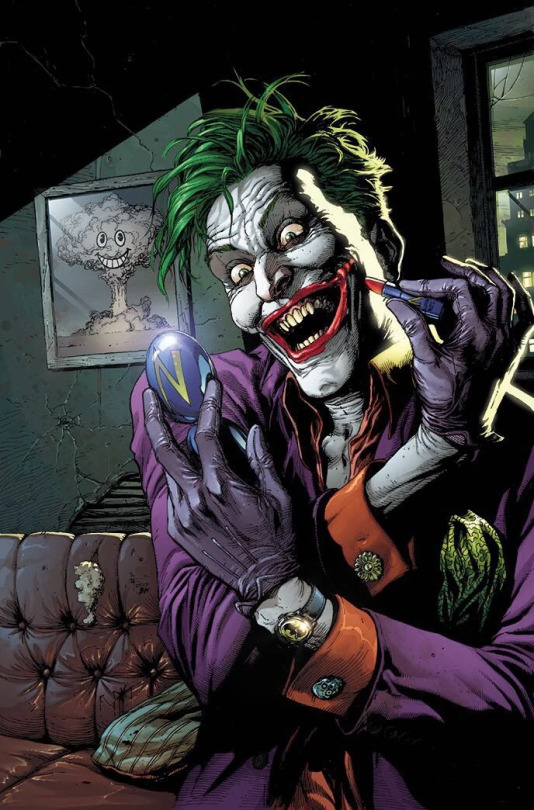
this is literally his picture on the wiki btw. also i feel like if you’re here i don’t need to argue that the joker is gay because he literally is. we’re doing gay joker analysis 2.0 here, sir
please note that i’m about to use a bunch of sexist and homophobic language, as i generally find that the most effective way to communicate the cultural norms that i’m about to touch on.
obviously, i’m using the word ‘gay’ when i’m talking about joker as a bit of an oversimplification. i’d use ‘queer’ or maybe even ‘queercoded’ (ugh), because it’s more accurate to how joker is actually portrayed, but when i grew up, gay was still very much a slur and gay-as-a-slur, an f-word, is in fact what the joker needs to be. this is for a reason: to me, the most important aspect about the joker is that he is a creation by straight men, meant to appeal to other straight men.
so yeah, problem solved right? the joker is the symbol for ultimate evil, so he generally represents whatever his writer thinks is the worst thing that exists and for a lot of straight men, that’s a gay dude. kinda sucks, but checks out.
except, that’s not the whole story, because straight men friggin’ love the joker. they’re dressing up as him, they’re quoting him, kinning him, coming up with elaborate backstories for him, leaving really intense youtube comments about how he’s the only one who really gets batman about him. in other words, they think the joker is cool. they think he’s really, really, really cool. They want to be the joker
why? that actually doesn’t check out at all. sure, he’s a villain who does whatever he wants, but most villains do and most of them haven’t been able to capture the hearts and minds of straight men the way the joker has. and joker has gotten more obviously gay over the years as he’s gotten more popular, not less. straight dudes love that the joker is gay!
time for some academic perspectives: our cultural attitude towards gayness are deeply interlinked with our attitudes towards gender roles and masculinity. and masculinity is a deeply strange concept and it is something that a lot of comics concern themselves with (see: straight men appealing to other straight men). while most comic book men are usually examples of hegemonic masculinity (the culturally ideal form of masculinity), the joker is at his core a failure of hegemonic masculinity, and him being gay is the easiest shorthand to straight men for communicating this. a true man is a straight man is a masculine man is a man who is not feminine is a man who is not attracted to men. queercoding men and failing masculinity is usually one and the same in practice.
here’s another thing about manhood: it’s often precarious. with ‘precarious manhood’, we refer to the phenomenon that manhood for men often feels like something that can be taken away from them. while being a woman is often conceptualized as something innate, for men it is much easier to be accused of not being a ‘real’ man. as such, men tend to be more pre-occupied with their own masculinity and often remain in a more anxious state in which they constantly try to re-affirm their manhood to both themselves and their surroundings.* this is what many people incorrectly refer to as toxic masculinity btw. It should also be noted that hegemonic manhood is a cultural ideal and therefore attaining it is fully impossible and this is leaving a lot of men frustrated. they reach for an unattainable goal under the treat of cultural punishment if they fail. also, this effect is generally stronger in straight men, as queer men generally already ‘know’ that they will never reach hegemonic masculinity, as it is defined through being attracted to women only, and therefore, in this aspect, they can walk the mile
so what is a frustrated straight man who is feeling like a failure of masculinity to do? well...what if there was a role model for you who is on every account a failure of masculinity too and he was thriving? what if there was a guy who’s laughing about all these gender rules and breaking them and maybe it made him even more badass? maybe there’s this complete failure of masculinity, not just walking the mile but running directly in the opposite direction and he’s scary and powerful and maybe that’s true power and maybe you are in some way even more powerful (masculine) than all those other guys who are effortlessly performing their masculinity. what then?
but is he gay? don’t worry straight men, of course he isn’t :)
(is he gay? yeah)
(but is he?? no, he isn’t (although he is))
seriously, is the joker gay? yes! but also no! because his purpose is to be a (lol) safe space for straight men to project their anxieties about their own masculinity on. the joker has to be gay in order to be an effective failure of masculinity, but he can’t be gay because then he’s just some gay guy whose nature is just naturally different from straight men/real men and straight men can’t project on him anymore.
so yeah whoops, it’s still homophobia. but at least it’s weird homophobia. it’s what the joker would have wanted * this also can lead to much greater difficulty for women to go against their assigned gender role, which is often constricting and oppressive. i blog about this a LOT on my main, so please don’t come for me on this
#batman stuff#this asshole#warning: this is very long and i don't like to capitalize#if there's any terms in here that need some more clarification don't hesitate to shoot me a message#i never know which terms are common knowledge and which aren't
300 notes
·
View notes
Text
Will and the car on fire (theories)
*this is just under the assumption this is Will in the pic and not some other character. Which is still very possible .
Why it could be Will (it's for sure possibly not)
But, most of the rebuttals saying it's not Will are iffy. Cause we really don't have much evidence to point to any 1 character. Like the hair counterargument: that the hair is too long to be Will's .Will's s4 body double has a similar hair tuff on the back of his neck. And we know st uses camera shots of the back of Will's neck/silouette ,in past seasons . So doing so here could make sense. And Will of course is the most associated with fire: using fireball for Will the wise in s1 (3 times), the will the wise drawing from s2 had flames on his cloak, Will being being burned in s2,etc.
So...Will looking at lightning. And (Will?) looking at fire. Both have a dark full body sillhouete and red in the forefront .
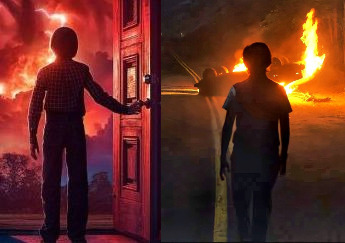
We also see this character is possibly wearing a watch like Will?
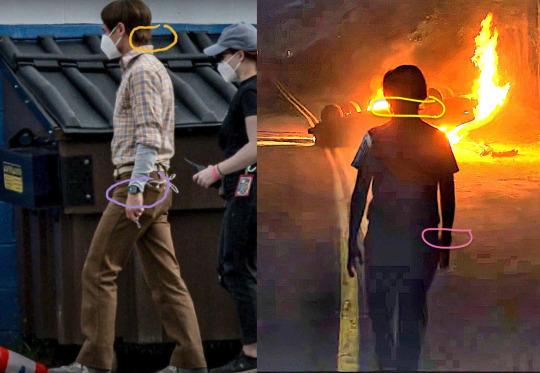
And i've been hearing this a lot here ... but southern california (where the Byers are) does have a lot of trees lol. Not sure why people think otherwise.But, regardless a trip from cali to Hawkins would most certainly have some forrest.
*Also, any movies I’ll be mentioning (in the theories , below) were stated to be inspiration for ST.
So theories...
Theory 1) It's Joyce's car ( and it was rigged to explode/look like an accident by Brenner or Lonnie). And Will wasn't there but sees it in a nightmare cause it's already happened/or it's a dream vision of the future.
Evidence: CAR TROUBLES: Joyce’s car model was infamous for exploding in car accidents-being sued by the state of Indianna before the start of the series. We also have Alexi tell murray about a way to cause cars to explode-and turn people into dust (and make it look like an accident). Brenner’s name means “to burn” and he already hurt 1 mother to keep a subject -so not out of the realm of possibilities for him to hurt Joyce (and make it look like an accident to try and get Will and or el).
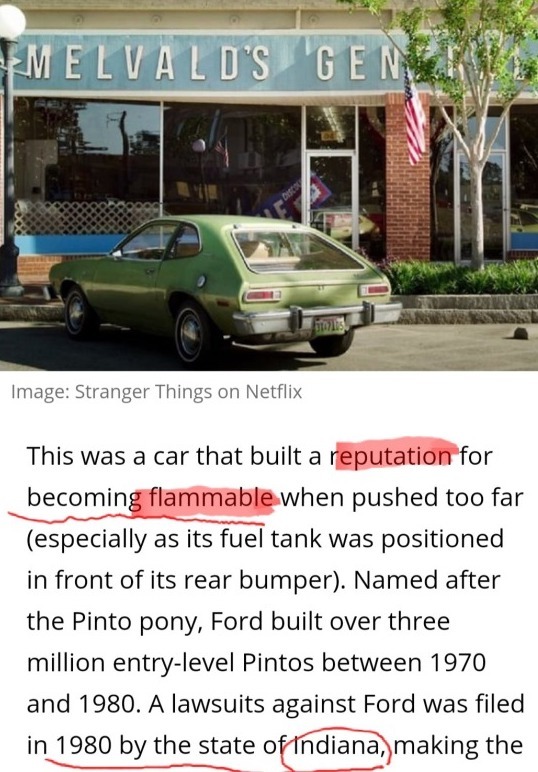
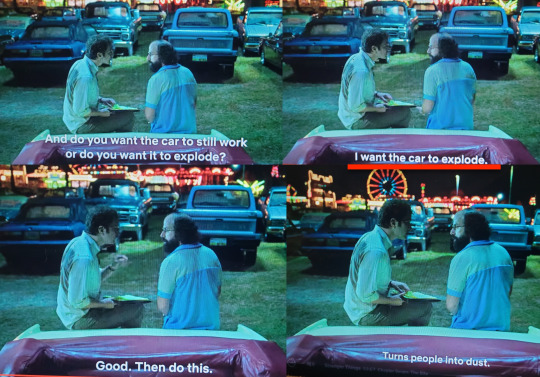
In s3, we have Jonathan and Hopper try and fix the car-and after this cars explode with people inside. Jonathan lifts the car hood- and notices someone rigged nancy’s car . Than, right after,Billy’s car lights on fire with him inside. With Hopper (he also lifts the car hood) and joyce barely escapes the lit car (but she may not be so lucky next time).
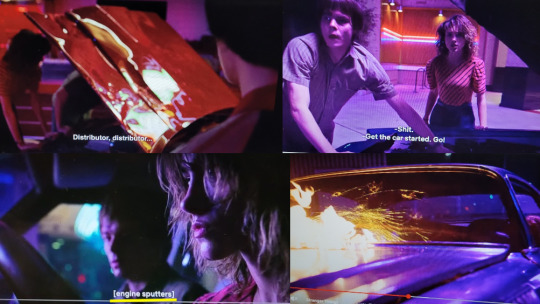
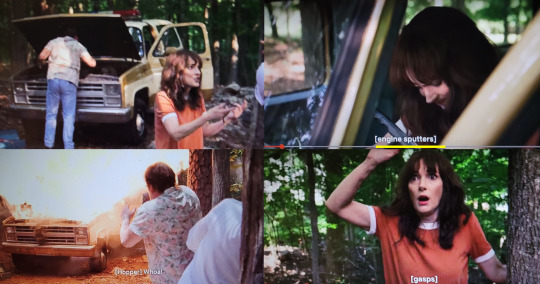
We also have Joyce tell Will 3x she’s going to be ok... which is a bit overkill if she will be OK ...
And, notice during the hoodlift we see Will observing- which is similar to Alexi watching and warning them before hand that the car (with Joyce inside) will explode. So it’s possible foreshadowing since Will may predict the future and was was paralleled to Alexi.Alexi ‘can we watch lonnie toons now?. Will : can we play d&d now?
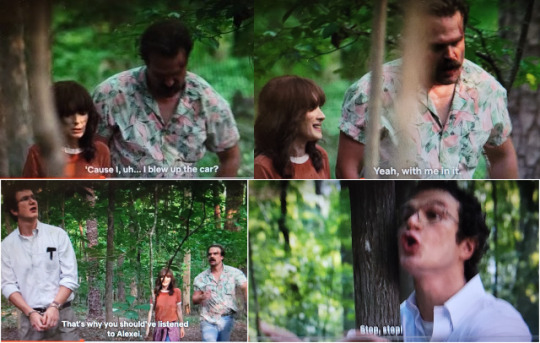
movie inspos:
It’s hinted s4 will be around Will’s b day: In gilbert grape- Arnie after his b day, has his mom die, and a fire was stagged that lit his mom on fire. ( Before this,Arnie was also raised by his older brother Gilbert cause his dad wasn’t around). stoker- kid’s parent dies in staged car ‘accident’ on her bday (this allows ab*sive relative closer to kid-since dead parent banned him from seeing kid). The kid was taught how to hunt, by dad. And is also a painter and bullied at school (like Will). what dreams may come-painter blames themselves for fam dying in freak car accident- the relative was getting a present for them when it happened. so they blame themselves. The descent- also had (right before a b day, the main character’s fam dying in a car accident) .And the sole survivor/family member of the deceased hallucinates a shadow chasing her in a empty hospital hall. Get out-photographer (jonathan)blames himself for mother dying in car accident.
There’s also a lot of other films where the kid (for no logical reason) blames themselves for their mom’s/parent’s death: goodson, dream catcher, analyse this,etc. Of course ... this could simply relate to max and el having survivors guilt after the mall killed their family members (in a fake ‘mall fire’). However, a fake out fire causing family to die (in s3) could be foreshadowing for it actually happening in s4?
rigged car explosions: scarface -have guys try and bomb a car with kids and parent inside. backdraft -guy raised by older brother had 1 parent die in explosion and sees the freak explosion occur- later in the film someone rigs a car to explode and masks it as a freak car accident. Same thing occurs in godfather- he sees family member die in rigged car explosion. The dark knight- rigs car to explode. batman v superman- calls superman a demon and says they need to burn the witch that bore him (aka his mom).
dreams (if in the past): Never ending story (reffed in s3)- starts with kid with bowl cut saying he had another dream about his mother who died. Peanut butter solution- kid has visions in dreams about people he knew who died in fire. this next movie (emily rose) is said to be Joyce byers inspo according to Winona - has (kid with 2 personalities) have nightmares from the past of her and her mother burning in a car fire. while screaming/sleep walking she burns windows with her hands -accidentally using her powers. Some people suspect the videogame “life is strange’ is show inspo too- it has character named max caufield with a ‘never maxine rule’, etc. Anyways in the game prequel queer chloe, who plays d&d, would have dreams/nightmares of her nice parent’s car accident . Despite , chloe not being present for the car accident. After the parent’s death, she’s stuck with her mean step dad.
dreams (if predicting the future): Will says in s3 Will the wise can see into the future. We also see Will/Will the wise via a dream predict Hopper was in danger-saying to Joyce “he’s going to die”. In ‘12 monkeys’ and ‘Rebel Robin st novel’ they mention the myth of cassandra- who could make accurate future prophecies , but was cursed to never be believed by those she warned. In 12 monkeys- he tries warning others of a dreaded event in future- and it’s dismissed as him being mentally ill. Since, Will’s other abilities were dismissed as his ptsd in s2-and with the Byers fam having a family history of mental illness (they may not believe him over such a prediction). In ‘the ring’-the movie opens with the guardian saying the boy is drawing the car accident that killed his mom -as a psychological coping mechanism. Only for the teacher to say he made that drawing before his mother’s death (and it’s revealed later the boy is psychic). Terminator 2- sarah conner says she is having future visions, which include explosions, and everyone dismisses it as her being schizophrenic. Like how in s2 a scientist said about Will “let’s see if this boy is a wizard or a schizo”.
If joyce survives the accident she may be hospitlized (and unable to have legal custody). In black swan the girl (with 2 personas) -blames herself for what happened to Winona Ryder’s character (who is in a coma after a car accident. They had had a verbal fight before the accident). In girl with the dragon tattoo- the main character (who is compared to a phoenix and dragon) has 1 parent burned in a fire- and after this her kind guardian is hospitilized so they can no longer take care of her- and she is placed with an ab*sive foster dad (who resembles her bio dad). If Joyce was in a coma - it would further parallel her to terry- and be another willel parallel.
if dead: Tokyodrift- mom loses custody, and dad who is a mechanic and abandoned the family years ago, later gets custody. Super 8-mom dies in freak accident- douche dad gets custody. Book of henry-mom dies pre-film, ab*sive dad got custody. Outsiders- parents die in car wreck, relative gets custody of teen who he slaps etc.In black swan-girl who blames herself for Winona’s accident is stuck living with ab*sive parent. good son- mom dies, stuck with violent and manipulative relative after this.
Of course-joyce may be fine. And Lonnie may just visit for Will’s b-day and ruin shit that way.
Theory 2) It's an undercover government car that Will uses his powers against in self defense... or in anger after they hurt someone he loves.
Evidence:
Joyce about ‘Will the wise’: If he’s so wise, why does he need the fireballs? Why can’t he just outsmart the bad guys? Will: cause the bad guys are smart too. Joyce: so he needs the fireballs? Will: Yeah, to burn them to a crisp.

* the fact-this flashback happens at a funeral of a Byers, could also be narratively significant as foreshadowing.
Gov agents in s1 are called “the bad-men” so Will may use fireball on “the bad-guys”(government agents) . Fire has been used on all the other adversaries relating to the upsidedown-so why not the gov agents (aka human villains) next? 2 movies on the inspo list caught my attention: firestarter & carrie (which are both stephen king adaptions with psychic kids who have fire abilities).
Firestarter- she has pyrokineseis (firepowers) . And unlike every other psychic in the film- she is the only psychic that doesn't get nose bleeds (aka mini brain hemorages) from using her powers (Will). We know el and kali gets nose bleeds.
(Anger): She only unleashes her fire abilities on gov agents after they kill her parent...

*And uses a literal “fireball” on them.
Could also be another willel parallel. kali about the US gov:" They took your mother away from you!" El str*ngles man from gov agency that incapacitated her mom . El before str*ngling him: " you hurt mama".
(self defense): While in carrie she kills people who tried to run her over with a car. And causes the car to explode.

Also, in s3 Steve does technically cause a car to explode to protect Nancy from being run over by a car (so maybe foreshadowing?). I believe, tumblr user ‘bran-who-writes-theoretically” was the first to point out the Carrie/car on fire parallel.
* This car scene could also be added to the list of Willel parallels. El in s1 uses her powers to flip a government-car upside down. And looks back at it. And it’s a ref to the film Et. So Will causing a government -car to explode and flip upsidedown (referencing carrie) could be a parallel.
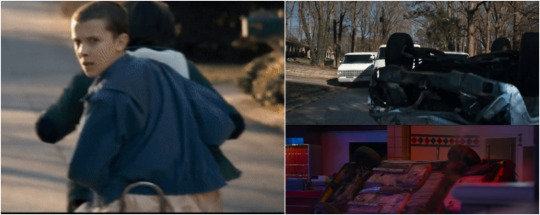
Of course El flipped over a car in s3 to attack the Soviet agents and protect her friends too ( right before losing her powers). Sort of like Steve using his car as a weapon in s3 to protect his friends. so who knows, if not Will, maybe El (wearing a ponytail) got her telekenesis back and she flips the car and it explodes ? To be honest, I just find this explanation too boring, cliche, and predictable. And I still hypothosize the mindflayer took her telekensis (but not her other powers). Since in d&d mindflayers have ‘mage hand’ (what el is called) and ‘telekenesis’/ along with the ability to steal powers from other life forms. But, we’ll see...
Theory 3) The car flips (maybe caused by a deer jumping in the road) and it blows up after the crash- with Joyce inside. And maybe Jonathan survives it/ Will wasn’t there but had a nightmare /vision about it?
Evidence: in s1 Jonathan sees a dead deer that was hit by a car. This could be symbolic : because it related to Jonathan mentioning the hunting story with his dad and how he cried for a week cause he liked the film Bambi. Which in the film : Bambi (a deer) has his mother k*lled. And after his mother’s death, he’s taken in by his douchey dad who was M.I.A for most of his life ,until his mom passed away. And the hunters are the bad guys in the film . In ‘get out’ the photographer , Chris,blames himself for his mother dying in a car accident - and he sees a dead deer hit by a car -and the dying deer was used to symbolize the guilt he has over his mother’s death. in ‘the long kiss goodnight’ a character is driving home with a friend- they swerve and hit a deer and 1 of them is ejected from the car into the forrest. But their friend is unconscious in the car and it quickly explodes on the road. The survivor turns and sees the car in flames- disoriented they stumble and kill the dying deer. And it’s left ambiguous if they were helping the deer end it’s pain or if it was vengeful-hunting (since it caused the car accident that killed their friend). Cause their face was emotionless from shock.

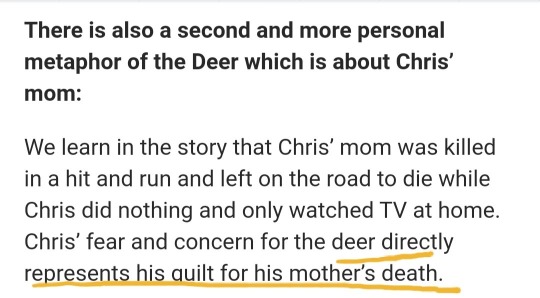
Even in the st novel "suspicious minds' rabbits- like jonathan was forced to kill on the hunting trip with his dad (around his b-day) represented the bond between mother and child.And the mother sacrificing herself for the baby-to not get k*lled (by Brenner).
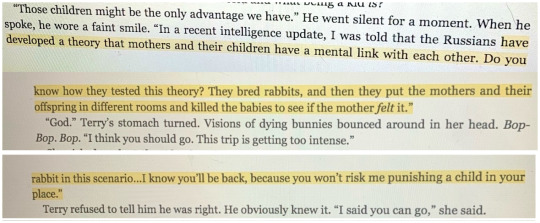
-so maybe?? jonathan before he gets the pizza job/car (may have his car break down , like hinted it would in s3).
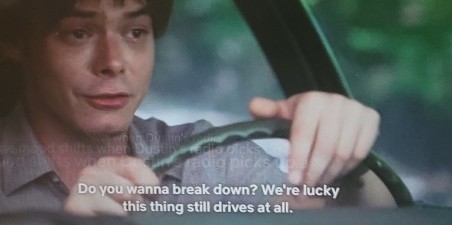
So him and Joyce share the car (once his car stops working) and the accident happens while Jonathan is behind the wheel -with Joyce. And after this he gets the job at surfer boy pizza. Billy was a surfer boy and that memory was used to think about his mother who is no longer around (once he's stuck with his ab*sive dad after moving away from Cali). While Jonathan moved to Cali after his mom passed-maybe stuck with Lonnie.Jonathan's actor in recent pics has a blonde mullet - which sort of resembles joyce/Billy's og hair. This may be why he starts doing dr*gs - which is pretty out of character for him- but it could be a coping mechanism(like in the s4 films). One of many examples was 'enter the void'- the older brother was surrogate parent to their lil sibling and after a car accident k*lls his parents , he starts doing dr*gs to cope. Also ‘hunger games’ was on the list- and Katniss (who was a surrogate parent to her litle sibling, like Jonathan is to Will) in the sequel, saw her family die in an explosion. And it really broke her emotionally.
I've mentioned this before but Billy is used to parallel and foil Will and Jonathan. And it may be more than a ... what if Lonnie had custody scenario. But to show how Lonnie (like most ab*sers) will later bring out the worst in the kids (once he does have custody). Like how s3 has Will mimick lonnie with the baseball bat (and we see in s3 Billy being bullied by his dad to play baseball and flashbacks showing him mimicking Neil). I've also discussed how there's a theme with pretty much every character mimicking their parent- for better or worse.
Killing a deer would certainly hint at Jonathan's possible character regression (and mimicking Lonnie to a certain extent). if he not only blames himself for Joyce's death. But is also stuck with his ab*ser.
The animal k*lling motif , and after that, mimicking an a b*sive father is already shown with el. Brenner , in s1,tried to make her k*ll a cat (using her powers) and she refused (similar to the s1 rabbit hunting story of Lonnie forcing Jonathan to k*ll a rabbit ). But in s2, she uses her powers to k*ll a squirrel (and like a deer- it's typical hunting game). Than in s3 el does literally everything Brenner ever asked of her- she spies on people and repeats the words back (like brenner told her to do), she becomes a weapon to ‘fight the commies’ (which was said to be the reason he k*dnapped her in the first place), and when looking into the void to see the mf (she mirrors the words brenner told her - when he made her go into the void to face the demogorgan).
And some s4 movies are literally about being trapped in a house with your ab*ser and slowly losing your mind because of the ab*se and gaslighting- lighthouse , black swan , good son, are prime examples. But movies like scar face , girl with the dragon tattoo, and book of Henry touch on this theme a bit as well. And ordinary people- is about a guy who survived a vehicular accident but his relative in the same accident didn't- and it causes him alot of issues /survivor's guilt.
The shadowy figure could just be Will in the shot - seeing it in a dream before or after it happens?
Theory 4) Will sees a future vision or has his ’now memories’ of someone else's car.
Evidence: i guess the s4 shot parallels El (in s3) spying on Billy while he’s hurting Heather. During that spying scene: the shot is of El near Billy's car. So it’s possibly a diff willel parallel?
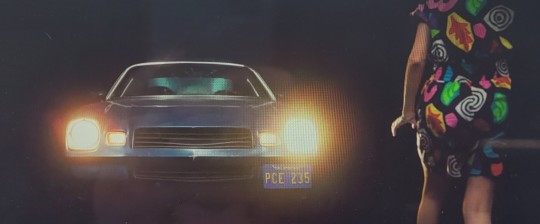
If not Will. Who knows ...if El’s telekenesis is gone maybe her spying abilities strengthened and look different because of it (and now she can see background details)?
Theory 5) it's Lonnie's car and Will escapes from the trunk and uses his powers in self defense
Evidence: I’m pretty iffy on this one. This goes back to how people suspected Lonnie took Will in s1 (and could be foreshadowing). Even the recent rebel robin book-has characters say Lonnie probably took Will. Jonathan suspected Will may be at Lonnie’s - so checks Lonnie’s car trunk (to see if Will is there). We also see how the mf in s3, knocked people out by dr*gs/str*ngulation, ties them up, and throws them in a trunk (to k*dnap them). Or how the cops raided jonathan’s trunk- which had stuff to track the demogorgan (and the demogorgan parallels Lonnie) . And after looking in Jonathan’s trunk-they suspected something fishy is going on.

*heather was described as “another me” by Will- who was thrown in the trunk.
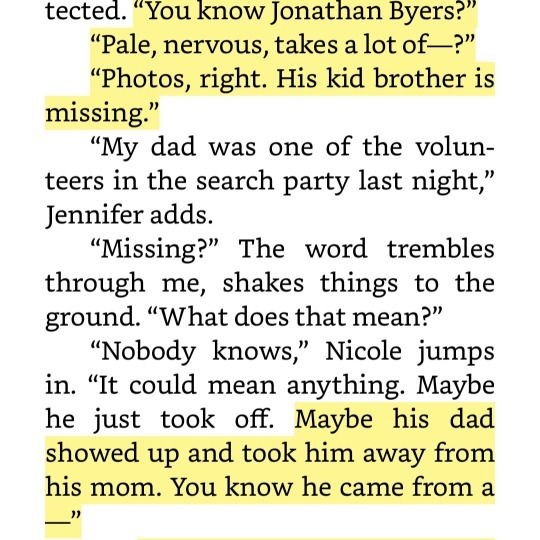
movies: “tangled” was on the s4 list- and had an ab*sive parent later try and kidnap their kid ,and that parent ends up dying. in girl with the dragon tattoo (the girl associated with dragons & phoenixes- lights her ab*sive bio dad on fire. In ‘drop dead fred’ (girl who is in love with childhood friend, named Mikey, who she met at age 5) lights a imaginary version of her ab*sive parent on fire - while in a trippy memory world. Chrissy accidentally lights her ab*sive relative (nickname “daddy”) on fire in self defense- in a trippy hell memory scape. in ‘long kiss goodnight- the girl with 2 personalities (Will/will the wise) was kidnapped and put in a trunk and escapes by jumping into a quarry. Not sure if that could relate to a flashback or something else? like in ‘don’t breath’ the older sibling who essentially was a surrogate parent to the younger sibling-mentions how their dad left the family, and her parent would throw her in the trunk for hours as a punishment.
114 notes
·
View notes
Text
Remembering to add more months later, here we go:
Resident Evil 7 (never finished but I just got it for my ps5)
Let's Build a Zoo (i love this game bc there are consequences for being evil)
Animal Crossing New Horizons
GTA San Andreas (fuck that train)
Amnesia: The Dark Descent (sooo fuckin good but i did wee a little while playing it. It was scary when Pewds played it and it's still scary now)
Stardew Valley (Sebastian is my husband)
Adding Stardew Expanded separate even tho it's a mod for Stardew Valley (Sophia my beloved wife she is such a well done character)
Dragon Age Origins (I've finished almost 3 times. Alistair is my husband and Leliana is my wife, I love them so.)
Chinese Parents (as someone who is Asian American I can attest that Asian parents are never satisfied lmao) (My grams in a constant state of disappointment)
Crusader Kings 2 (I tried but the UI for that game is bad)
Borderlands 1 (v good, played as Lilith. Switch port not so good)
Borderlands 2 (excellent, killing jack was v satisfying. Switch port is good. Better on pc even tho my pc can't handle it as well.)
Borderlands the Pre-Sequel (it's ok. Playing as Jimothy Jack was fun. Don't notice a difference between the PC port and the Nintendo Switch port.)
Tales from the Borderlands (v good. Had so much fun. Rhys and Zer0 are def a couple. Also like Rhys and Fiona and Rhys and Sasha. All really good pairings.)
Borderlands 3 (garbage. Fucking awful. Gameplay was pretty good. Story was shit. I love Lorelei and Rhys and Zer0's interactions. Calypso twins were weak villains. Lilith's character was just ruined further imo. Garbage fucking game.)
Tell Tales Walking Dead (finished all but the final season. So good tho)
Assassin's Creed 3 Remastered (it orange now ig?) (I have finished that game, I love Connor)
Ace Attorney (I haven't finished it but it is fun when I get super bored)
Batman Arkham Asylum (pc port keeps crashing idk. Haven't been able to finish it.)
TellTale Batman season 1 and 2 (haven't finished 2 but also messed up my save a little. Got it on my Switch. Really fun and Troy Baker is excellent as Bruce in this just like he was excellent as joker in the Arkham series)
Genshin Impact (Yes I played the anime game. It's kinda fun. I competed Sumeru so fast but, I also didn't like a lot about how they did Sumeru so that's why)
Jedi Fallen Order (got it on sale bc idc about the Star Wars games or expanded media as much as i care about the movie trilogy (excluding the newer movies jj Abrams and rian Johnson just had to fuck that up) and Clone Wars. Died in the tutorial. Had fun but it needs to be played like a soulsbourne game and I'm just not skilled for that. It's got a good intensity to it at the very start that I really liked)
Will probably update again later.
Video Games I Played
Not finished, just played. I’ll say whether I’ve finished playing them or not:
L.A. Noire
Dragon Age: Inquisition (finished)
Resident Evil 6 (finished)
Alice Madness Returns
Assassin’s Creed IV: Black Flag
Assassin’s Creed: Syndicate
Assassin’s Creed: Origins
Mass Effect Andromeda (returned it)
Animal Crossing New Leaf (I have 2 copies)
Legend of Zelda: Ocarina of Time
Pokemon Red
Pokemon Yellow
Snipperclips
DmC: Devil May Cry
Saint’s Row The Third
Saint’s Row 4
Saint’s Row 2
The Sims 3
Rayman Origins (stopped playing)
Skyrim (gave up)
Fallout 4 (gave up on this one too)
Dragon Age 2
Mass Effect trilogy
Animal Crossing Pocket Camp
Pokemon Go
Sonic Mania
Death Squared
#video games#pc gaming#nintendo#nintendo switch#nintendo 2ds#steam games#bioware#ubisoft#rockstar games#infinity ward#activision#PlayStation 5#PlayStation 2#ps2#ps5#ea games#telltale games#gearbox#game freak
3 notes
·
View notes
Text
On Kong Kenan/Super-Man
It should've been him. He should've been the Superman of 5G/Future State/right now not Jon, and he should be the one getting an HBO Max series not Val. Hell he should be getting a movie!
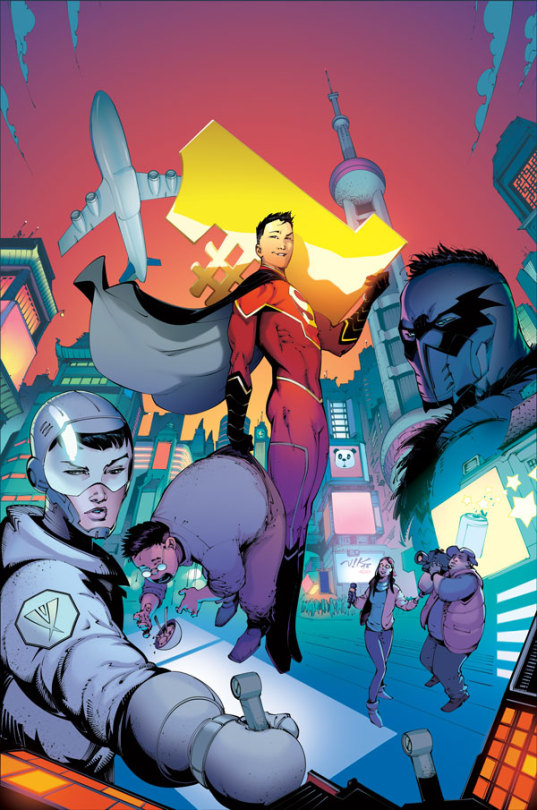
God this dude is literally the best legacy character Superman has ever gotten, wholly his own person with his own lore and status quo while still building on the idea of "Superman". I am so pissed at DC for essentially just dropping him after his ongoing ended, what the hell Lee? You keep trying to make the Wildstorm characters happen, I need you to get my man Yang another Kenan book.
Have to admit I was a bit nervous at first about whether or not Kenan would be a worthwhile character. Yang's New 52 Superman run had been a disappointment to me overall, with only the the arc where Superman has underground wrestling matches against forgotten gods really sticking with me. Now he was introducing a brand new Superman? Didn't feel like he had "earned" that yet. But from the first issue I was hooked on this new character.
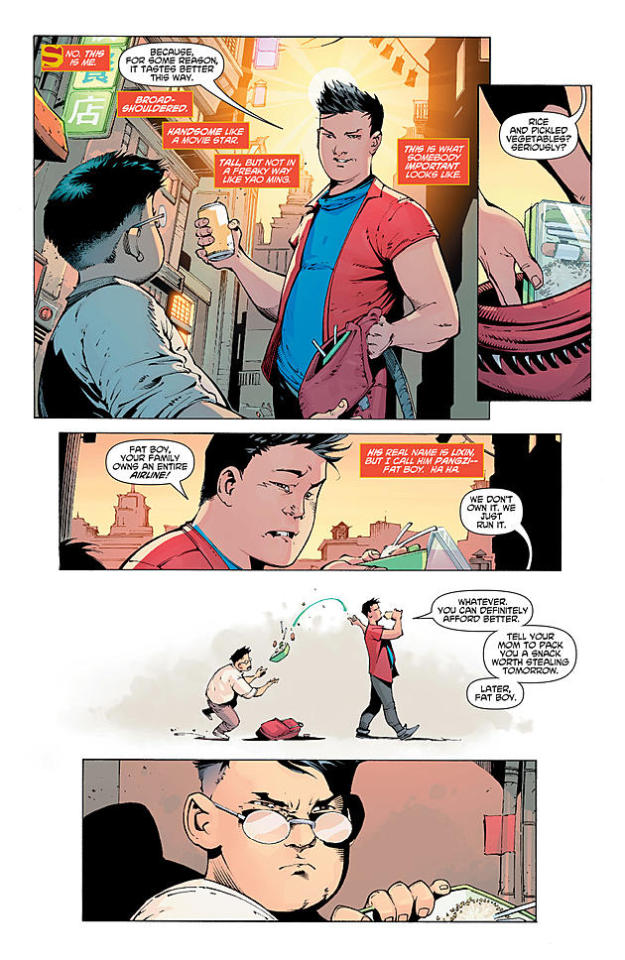
Kenan was unlike any other member of the Superfamily. He wasn't kind or sweet, he was an asshole! He was a bully! He was fantastic! Right from the start Kenan was set up to undergo a very different kind of character journey than the other members of the Superfamily. Empathy, humility, respect for people weaker than himself, these are all traits most heroes wearing the S-shield already posses by the time they first don the crest, but not Kenan.
Like all bullies he was even a bit of a coward himself at first, trying to bail on the experiment meant to give him Superman's powers right as it begins. After "saving" Lixin (the kid he bullies and steals lunch from every day) from Blue Condor he demands all the money Lixin has on him as payment. He's not courageous or selfless either at the start, Kenan is as much of an opposite of Superman as you can get short of being Bizarro. Learning the appeal of these traits formed the basis for his growth over the course of his series.
Seeing Yang bring in a lot of recognizable "Superman" elements in the series, but with a twist, was also great. Kenan is the one who bullies "Luo Lixin" rather than the traditional Clark/Lex friendship of Pre-Crisis and Birthright. Initially Kenan develops a crush on intrepid reporter for Primetime Shanghai, Laney Lan, but she dismisses him as too young and Kenan eventually ends up pursuing Avery Ho (Flash) instead. Baxi the Bat-Man of China has a similar relationship with Kenan as the traditional Superman/Batman in terms of being vitriolic best buds, however Baxi is the one who has the most respect for authority while Kenan is the rebel. Kenan is a part of the "Justice League of China" which does not meet with the approval of the already established Chinese superheroes, the Great Ten. That contrasts nicely with the good relationship the Justice Society and Justice League have, as well as seeing Yang lampshade the "Chinese copy" trope and incorporate that into his storytelling.
One of the funniest differences is how Kenan chooses to immediately reveal his identity as Super-Man to the world by taking off the compliance visor he was forced to wear, contrasting with Clark's choice to hide his identity. He was so eager to impress people that he never gave any thought to the danger he could put himself or his family in by revealing his identity until it was too late, something Clark is well aware of and has taken great pains to keep his identity secret. Was a missed opportunity for DC to have Kenan comment on Clark copying him for once when he outed himself under Bendis.
But one of the most poignant differences between Clark and Kenan is the gulf in separation between their relationship with their parents. Clark has a loving relationship with Ma and Pa Kent, trying to live up to their lessons as best he can. In contrast Kenan's mom was believed to have died in an airplane crash when he was just a child, and he never really knew her. His father was distant from him after that and the two weren't really close despite Kenan's attempts to impress him. So Kenan lacks that strong connection while still clearly loving both of them.
Pa Kent's death is one of the most tragic examples of Clark's love for his parents, and I've always been a fan of takes where Clark promises his father to fight for the powerless on Pa's deathbed. Kenan gets a similar scene at the start of his career, his dad "dies" (after being exposed as Flying General Dragon, a pro-democracy "supervillain" from the Chinese authorities perspective) and wants Kenan to promise he'll fight for Truth, Justice, and Democracy. But because Kenan's dad never really bonded with him, Kenan doesn't know what those mean, and can only promise that he never wants to see people die, something his father takes comfort in at least. In classic comic book fashion it's revealed that Dr. Omen, Kenan's "boss" and the one who gave him his powers, saved Kenan's father, because she is Kenan's mother! Kenan's relationship with his parents forms a lot of the crux of his character arc, and seeing how Yang utilizes the classic Superman concept of family kept the storytelling exciting.
Yang's brilliant exploration of the concept of "Superman" through the prism of Chinese culture was a great way to differentiate Kenan as well.
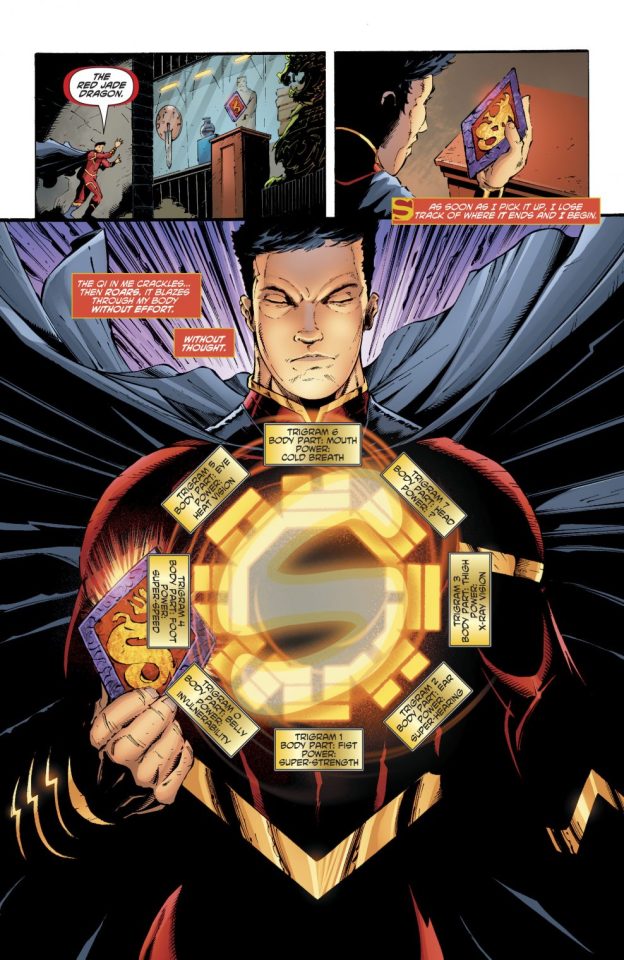
I absolutely freaking love how he tied to the concept of Qi to the S-shield in particular. Connecting the shape of the shield with the way Kenan has acquired his powers along the path of the Bagua (eight trigrams used in Taoism that represent the fundamental principles of reality), with his octagon S-shield outline representing all eight principles together, was mindblowing! So was the idea of restricting Kenan's access to his powers unless he was actually acting in a Superman manner, that tied his character growth to his power growth in an entertaining manner. There were so many characters and concepts that meshed Chinese and DC lore together, like how Emperor Super-Man was Kenan's "Doomsday", they even recreated that iconic dual kill shot! The Chinese Wonder Woman Peng Deilan, being based on the Chinese Legend of the White Snake! There was even some Korean mythology referenced with the Aqua-Man member of the JLC "Dragonson".
Yang also managed to do a Superman Blue/Superman Red story with Super-Man Yin/Super-Man Yang!
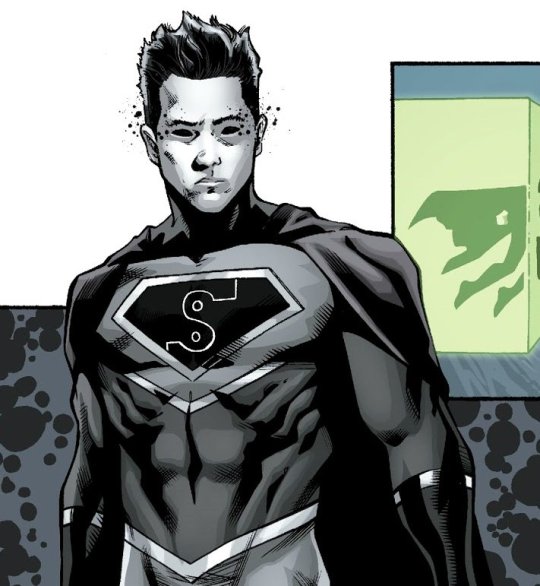
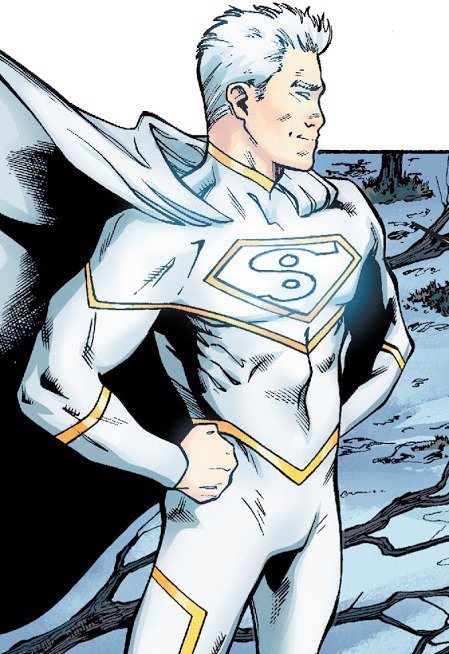
Shameful that it took me a while to realize what Gene Yang was doing but once I caught on I was touched. You can tell how much Yang loved Superman and his mythology, and how he was excited to incorporate as much from Clark as he could, while still using it in a way that was solidly Kenan's. And not just Superman's mythology, but the history and lore of the entire DC Universe. I-Ching got to be brought in, fleshed out, and used as Kenan's mentor! The "Yellow Peril" villain from Detective Comics #1, the comic DC gets its name from was brought in and revamped as I-Ching's twin brother All-Yang! Hats off to Yang for taking a racist caricature and attempting to make him into something more.
This series was a beautiful attempt by Gene Yang to build a space for Asian heroes and villains where they could be more than stereotypes, Kenan himself being a defiant mold-breaker in every regard as the complete opposite of most Asian characters in Western media (a jock, a bully, loves his dad but not on great terms with him, a powerhouse as a hero, etc). So much thought and hard work was poured into this by Yang and his team of artist collaborators.
Especially the costumes, man Kenan had so many great looks. From his starting outfit (which is my favorite Superman variant not worn by Clark himself), to the one with the Yin/Yang shield he acquired later on, to his Super-Man Yin & Super-Man Yang outfits, Kenan looked damn cool. Part of me is bummed they didn't go with the Chinese character shield they toyed around with, but I loved how Yang used the "s-shield" as a plot point, so I'm not too broken up over it.
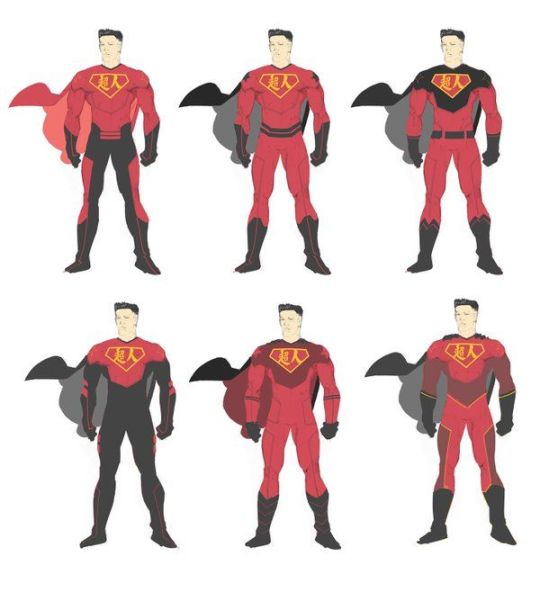
All that great work Yang did to build that space up has been more or less forgotten sadly. It was nice to see Kenan in the DC Asian Month Celebration issue. Avery is going to be in Justice Incarnate at least (unsurprising considering she was created by Williamson). So fucking bummed that Superman Family Adventures cartoon didn't happen, they were going to have Kenan and John Henry Irons in it! Would've been a dream come true for me to see Irons in animation again, and Kenan making the jump to outside media! Maybe that would've encouraged DC to let Yang keep writing New Super-Man, or at least encouraged them to use him elsewhere instead of allowing him fall into Limbo.
Unfortunately I'm not sure what the future holds for Kenan. Jon is being pushed as Clark's replacement in the comics, with DC keeping all the other contenders such as Kon benched. Calvin is leading the Justice Incarnate team likely due to the upcoming Coates reboot that will make Clark black. Val will probably get something once Taylor leaves Jon's book or once they officially announce the HBO Max show is happening. So where does that leave Kenan, my new favorite PoC legacy hero? Currently my only hope is that Yang is working on something for DC involving him. Yang left Batman/Superman, where I was hoping to see a Baxi/Kenan team up, to go work on "exciting other opportunities" per his Twitter. So fingers crossed that there's something in the works for Kenan!
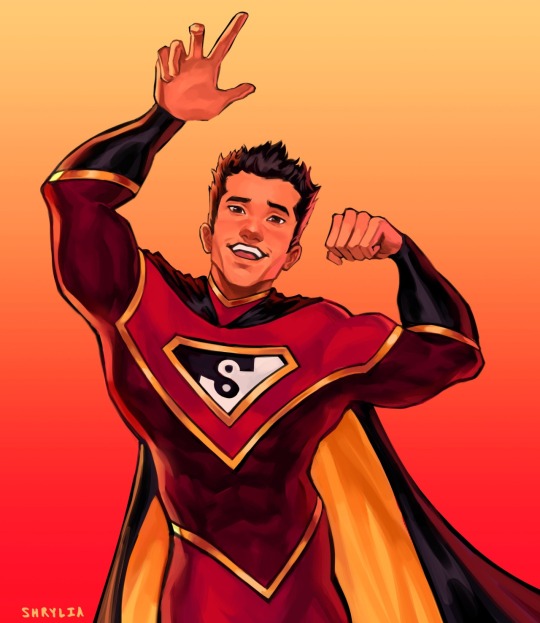
One day I hope he gets his day in the sun again.
144 notes
·
View notes
Note
While the art is left to be desired (i'm hope i use this ohrase right, my english is awful). I suprised that i found future state!Jason to be more enjoyable than Urban Legend one. Like he's way more capable there and [spoiler alert] also Bruce depend on him and still call him son? So you can have a bad ass Jason and good son jason at the same time.
So I need to apologize because this turned into a rant about Jason's characterization as whole and MAN is it long-winded and I'm sorry.
I have to agree. I really like the characterization Future State/Dark Detective is going for with Jason.
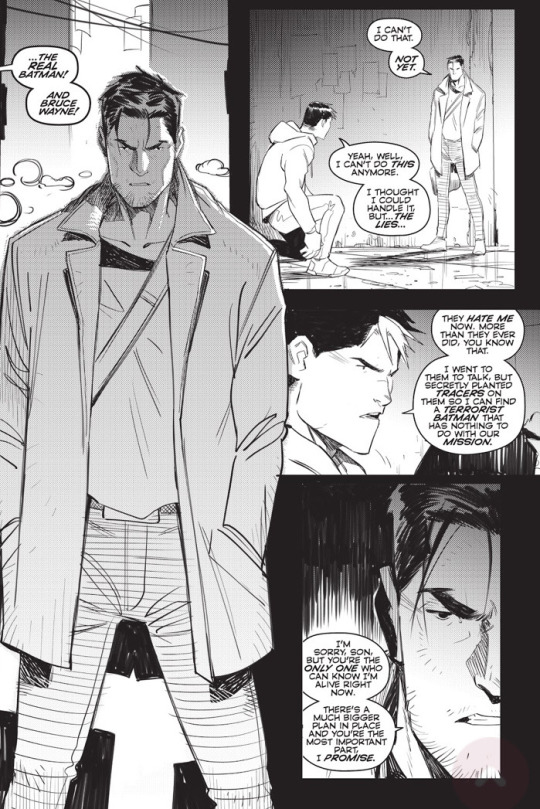
Jason is still the typical Jason we've grown to expect. Cold, cynical, snarky, willing to cross the dark red line and kill if need be, but he's still shown to have emotions. When he's betraying the family it's vocalized by Jason that he's upset about the situation. He doesn't want to, but he must for the mission Bruce put him under.
Truth be told, I'm not fully caught up on Future State/Dark Detective. I've kind of been reading spoilers and just getting the general gist in the periphery from people like you on Tumblr. I've been more focused on Urban Legends, which, while I will say I still don't hate the story, hell we still have two issues left of Cheer, and I by no means think Chip Zdarsky is a bad writer by any means. His characterization of Jason irks me.

*God I was so on the fence about Eddy Barrow's take on Jason until Issue #3. That right there? THAT. That's a handsome ass man Maurry*
ANYWAYS: I'm irked by Zdarsky's take on Jason just because of how hot headed and brash Jason is. Now don't get me wrong, every main writer for Jason has taken a bit of a different spin and while the big characters who have written Jason (Judd Winnick, Scott Lobdell, Tony Daniel) and while Zdarsky seems to be what I'm hoping to be a bit of a medication of Jason & Bruce's relationship. He's doing it at the expendature of Jason's characterization of being a damn near criminal mastermind.
If we focus on Winnick and Daniel's interpretation of Jason (Winnick wrote the original Under the Hood & Lost Days. Daniels wrote Battle for the Cowl) as well as all Pre-New 52 versions of Jason. Jason is a monster. Like genuinely a horrible human being. He still fights for right moral side (he kills mostly child abusers/drug traffickers and the likes) but this Jason is genuinely unhinged and while smart, he's absolutely monster. Hell, in Battle for the Cowl after hearing Bruce's final words, he has a villainous breakdown. Dresses as batman, and starts killing people. Judd Winnick himself said he sees Jason as a 'Psychopath' and there are a lot of very vocal people who say Winnick's original interpretation of Jason as a violent, misanthropic villain is the superior version and that Jason should return to this.
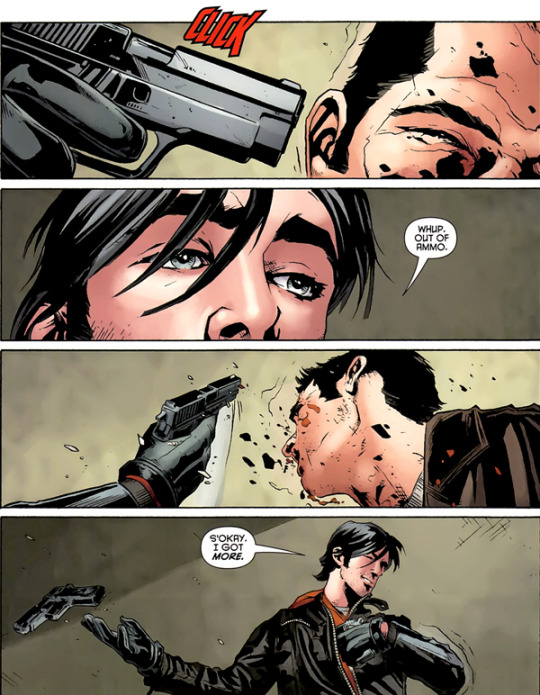
*I love to point out that I made a post on my alt account questioning Jason's age in this issue. Turns out he's Like SEVENTEEN. I get why they draw him older and more mature because of his darker/more villainous tendencies. But there's something kind of True Crime Podcast host fascination I have with this greasy, crusty, 17 year old who just casually kills 30 mobsters in horrific gun violence and calls it a day.*
Then we have the New 52. And in comes Red Hood & The Outlaws + the eventual Red Hood: Outlaw series. Piloted by the one Scott Lobdell. Now I know a lot of people dislike Lobdell for his takes on certain characters, his all-over-the-place writing style. (Let's not forget his allegations of SA and the fact that he openly admits that he wrote Jason as a self-insert for a 'bad guy seeking redemption') this was my first comic experience with Jason and to be honest, I can't bring myself to hate it. Sure there's some parts that literally show how much of a dumpster fire Lobdell's writing can become, but for the most part I genuinely liked the characterization of Jason that Lobdell gives. Jason may be a bit more reactionary and just kind of making shit up as he goes along, but he's far from dumb. The intro to the series has Jason sneaking into a terrorist run nuclear sub and killing everyone inside.
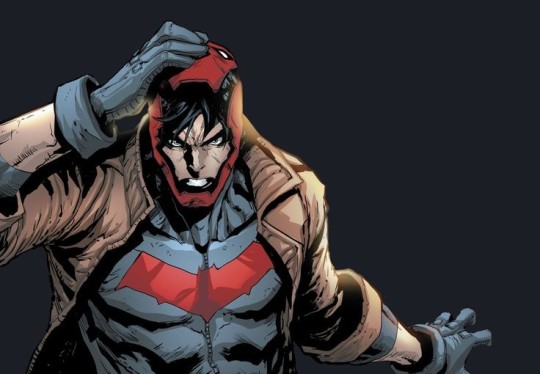
Again: Lobdell's writing is all of the place. But I do like that his take on Jason is a bit more subdued. I know in the New 52 they wanted to make Jason an Anti-Hero. Someone who very much still driven by emotion and revenge. But he's definetly more relaxed and even has a lot of fun. Intelligence wise he has is moments, but it does emphasize that while he may be the best read Robin, he does have a tendency to leap before he looks. Also all the art for RHATO with the exception of a few series were TOP TIER. I understand why they hired artists like Kenneth Rocafort and Dexter Soy to rehabilitate his image. I mean, come on.
Now if we're talking about Jason's intelligence, I'd be absolutely remiss if I didn't discuss Red Hood: Outlaw and the Price of Gotham Arc. Specifically this exchange between Bruce & Jason. To me, this is the single best part of Lobdell's run and shows Jason's true intelligence.
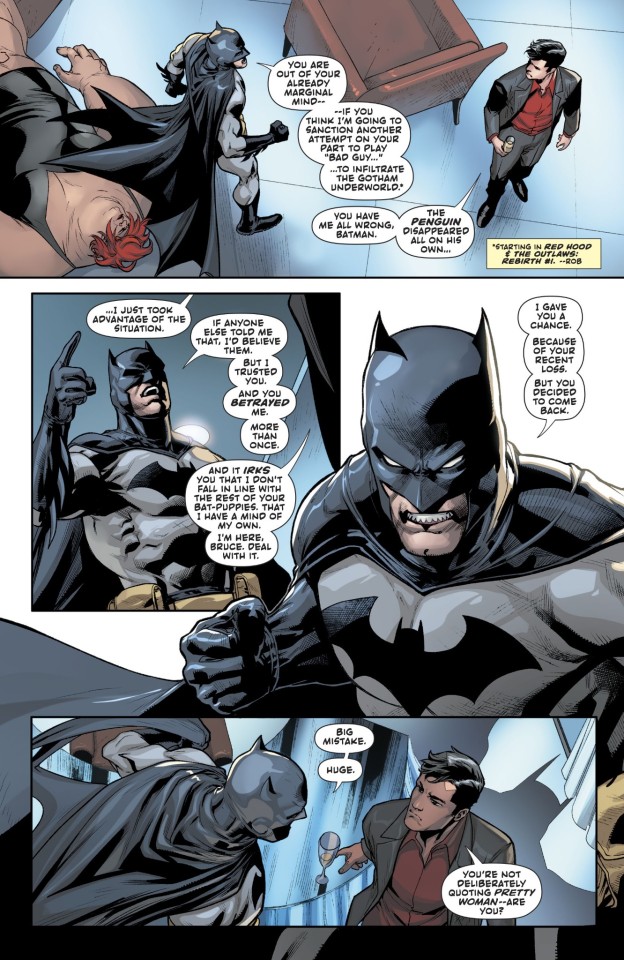
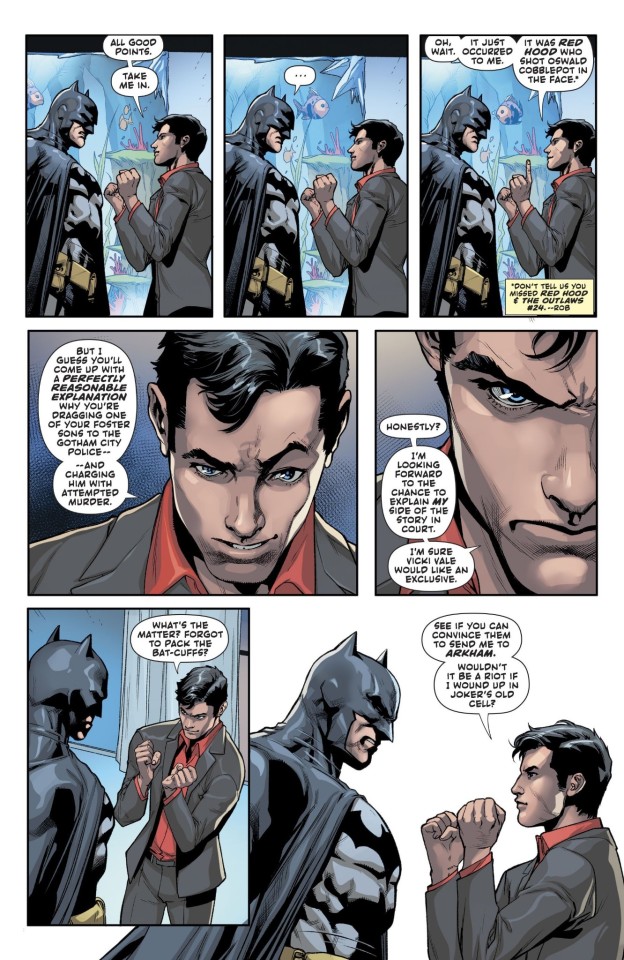
To give a rundown: After Bruce banished Jason from Gotham after seemingly killing the Penguin. Bruce proceeded to find Jason and literally beat him to within an inch of his life. It took MONTHS for Jason to recover. A lot happens but mostly Jason finds out (from Bruce no less) that Penguin is still alive. Jason hatches a devious plan. He takes over the iceberg lounge, kidnaps and holds Penguin hostage. Publically outs himself as Jason Todd, the dead ward of Bruce Wayne, as alive and well, and the new owner of the Iceberg Lounge.
When Bruce finds out he's clearly pissed and goes to confront Jason because he's banished him from Gotham. But because Jason outed himself as alive and one of Bruce's sons. Batman can do NOTHING. Jason has Bruce by the balls. If Bruce does anything to Jason while he's out and alive as Jason, all Jason has to do is tell the truth. And the whole Batman jig is up in an instant. And Bruce? After these panels? He runs off with his tail between his leg because he can't touch Jason. And all Jason did was capture penguin, and come out as alive. THIS is the Jason that I love. This is the Jason that strikes fear into people's hearts.
I think a lot of the general complaints we see about Jason as a whole is just how inconsistent he is with his writing. Which I agree. It's hard to characterize Jason well when there's been a character like Lobdell who was at the Helm of Jason's character for 10 years and then forced to leave. And I don't really know if DC has any really solid plans for his character and development. There's a lot of hype surrounding the end of Cheer and them saying it'll 'change Red Hood & Batman's relationship forever' as well as with Jason being featured in the new Suicide Squad coming this August, and Jason getting a feature in an issue of Robin. It'll be interesting to see where they take the character. Personally I do want a resumption of Jason. But like Harley Quinn where they're taking their sweet time redeeming her. Jason has done A LOT of awful things and of they wanna make him a hero, I want a few years to pass in terms of monthly issues before we see Jason become a hero again.
*edit: spelling*
#Jason Todd#Bruce Wayne#Batfam#red hood and the outlaws#red hood outlaw#batman urban legends#Batman future state#Red Hood#Red Hood lost days#judd winick#scott lobdell#Battle for the cowl#im sorry this is long#thanks for the ask!
115 notes
·
View notes
Text
Enter Batgirl, Exit Penguin (Part One)
Okay, so here we are. The first episode with the new Batgirl, Barbara Gordon, and you need to know a little bit about her history before we continue.
Here's the thing. Julie Newmar, who played Catwoman for the first two seasons, left the show. Why doesn't matter for our purposes. What does matter is that Eartha Kitt was cast to replace her. A woman of African and Cherokee descent playing one of the most iconic villains on one of the hottest shows? Awesome, right?
Well, no. See, America is racist. And it was exceptionally, obviously, vocally racist back in the late sixties. Especially in the South, where they frequently refused to air shows that showed things like interracial romances.
Which was a huge problem for this show for two reasons: one, the southern United States is kind of a big TV market and two, Catwoman was kind of Bruce's unofficial love interest in the previous two seasons. The producers felt they had to choose: they could keep up the sexually charged dialogue between Batman and Catwoman (which Eartha Kitt, let's be honest here, would have done better than Julie Newmar) or they could continue to air in the South. Understandably, but regrettably, they chose the South.
The producers had another problem, too. Their female viewership numbers stank. They wanted to attract more women to the show, and felt a new, female hero was the answer to that problem.
Now, DC had problems of its own. There had been a previous Bat-Girl, and Batwoman, but the Kanes were lame. Like, really lame. So editor Julius Schwartz canned them in '64 or so. But DC wanted to hold on to the rights to the Batgirl name, and like the show's producers wanted to draw in more female viewers.
So, one day, William Dozier, Julius Schwartz and artist Carmine Infantino (one of the great unsung heroes of Batman comics) sat down and solved their problems with one elegant solution: Barbara Gordon, the badass daughter (I feel that needs to be emphasized due to The Long Halloween's animated adaptation coming out. Much as I love Loeb and Sale's work, between them and Frank Miller they managed to do a lot of damage to Barbara by de-aging her and making her Gordon's adopted niece) of Police Commissioner James Gordon. She was a brown belt in Judo, had a doctorate in Library Sciences and was a crafty detective in her own right.
So what's the point of all this? The point is, prior to Crisis On Infinite Earths, Barbara was designed as an equal to Batman, not Dick Grayson. That... smear, on her character, only came later. After Frank Miller and Alan Moore and Jeph Loeb and Tim Sale and yes, as much as I hate to admit it, the BTAS crew. It is only via the direct intervention of Kim Yale and John Ostrander that we even have Barbara today and honestly? Compared to what she was pre-Crisis, sometimes even Oracle feels like a slap in the face.
#batman#batman 1966#batman 66#batman '66#live blogging#adam west#yvonne craig#batgirl#enter batgirl exit penguin
15 notes
·
View notes
Text

Hans Walter Conrad Veidt (22 January 1893 – 3 April 1943) was a German actor best remembered for his roles in the films Different from the Others (1919), The Cabinet of Dr. Caligari (1920), and The Man Who Laughs (1928). After a successful career in German silent films, where he was one of the best-paid stars of UFA, he and his new Jewish wife Ilona Prager were forced to leave Germany in 1933 after the Nazis came to power. The couple settled in Britain, where he took British citizenship in 1939. He appeared in many British films, including The Thief of Bagdad (1940), before emigrating to the United States around 1941, which led to his being cast as Major Strasser in Casablanca (1942).
Hans Walter Conrad Veidt was born in his parents' home at Tieckstraße 39 in Berlin to Amalie Marie (née Gohtz) and Philipp Heinrich Veidt, a former military man turned civil servant. Veidt would later recall, “Like many fathers, he was affectionately autocratic in his home life, strict, idealistic. He was almost fanatically conservative.” By contrast, Amalie was sensitive and nurturing. Veidt was nicknamed 'Connie' by his family and friends. His family was Lutheran, and Veidt was confirmed in a ceremony at the Protestant Evangelical Church in Alt-Schöneberg, Berlin on 5 March 1908. Veidt's only sibling, an older brother named Karl, died in 1900 of scarlet fever at the age of 9. The family spent their summers in Potsdam.
Two years after Karl's death, Veidt's father fell ill and required heart surgery. Knowing that the family could not afford to pay the lofty fee that accompanied the surgery, the doctor charged only what the family could comfortably pay. Impressed by the surgeon's skill and kindness, Veidt vowed to "model my life on the man that saved my father's life" and he wished to become a surgeon. His hopes for a medical career were thwarted, though, when in 1912 he graduated without a diploma and ranked 13th out of 13 pupils and became discouraged over the amount of study necessary for him to qualify for medical school.
A new career path for Veidt opened up in 1911 during a school Christmas play in which he delivered a long prologue before the curtain rose. The play was badly received, and the audience was heard to mutter, "Too bad the others didn't do as well as Veidt." Veidt began to study all of the actors he could and wanted to pursue a career in acting, much to the disappointment of his father, who called actors 'gypsys' and 'outcasts'.
With the money he raised from odd jobs and the allowance his mother gave him, Veidt began attending Berlin's many theaters. He loitered outside of the Deutsches Theater after every performance, waiting for the actors and hoping to be mistaken for one. In the late summer of 1912 he met a theater porter who introduced him to actor Albert Blumenreich, who agreed to give Veidt acting lessons for six marks. He took ten lessons from him before auditioning for Max Reinhardt, reciting Goethe's Faust. During Veidt's audition, Reinhardt looked out of the window the entire time. He offered Veidt a contract as an extra for one season's work, from September 1913 to August 1914 with a pay of 50 marks a month. During this time, he played bit parts as spear carriers and soldiers. His mother attended almost every performance. His contract with the Deutsches Theater was renewed for a second season, but by this time World War I had begun, and on 28 December 1914, Veidt enlisted in the army.
In 1915, he was sent to the Eastern Front as a non-commissioned officer and took part in the Battle of Warsaw. He contracted jaundice and pneumonia, and had to be evacuated to a hospital on the Baltic Sea. While recuperating, he received a letter from his girlfriend Lucie Mannheim, telling him that she had found work at the Front Theatre in Libau. Intrigued, Veidt applied for the theatre as well. As his condition had not improved, the army allowed him to join the theatre so that he could entertain the troops. While performing at the theatre, his relationship with Mannheim ended. In late 1916, he was re-examined by the Army and deemed unfit for service; he was given a full discharge on 10 January 1917. Veidt returned to Berlin where he was readmitted to the Deutsches Theater. There, he played a small part as a priest that got him his first rave review, the reviewer hoping that "God would keep Veidt from the films." or "God save him from the cinema!"
From 1917 until his death, Veidt appeared in more than 100 films. One of his earliest performances was as the murderous somnambulist Cesare in director Robert Wiene's The Cabinet of Dr. Caligari (1920), a classic of German Expressionist cinema, with Werner Krauss and Lil Dagover. His starring role in The Man Who Laughs (1928), as a disfigured circus performer whose face is cut into a permanent grin, provided the (visual) inspiration for the Batman villain the Joker. Veidt starred in other silent horror films such as The Hands of Orlac (1924), also directed by Robert Wiene, The Student of Prague (1926) and Waxworks (1924), in which he played Ivan the Terrible. Veidt also appeared in Magnus Hirschfeld's film Anders als die Andern (Different from the Others, 1919), one of the earliest films to sympathetically portray homosexuality, although the characters in it do not end up happily. He had a leading role in Germany's first talking picture, Das Land ohne Frauen (Land Without Women, 1929).
He moved to Hollywood in the late 1920s and made a few films there, but the advent of talking pictures and his difficulty with speaking English led him to return to Germany. During this period, he lent his expertise to tutoring aspiring performers, one of whom was the later American character actress Lisa Golm.
Veidt fervently opposed the Nazi regime and later donated a major portion of his personal fortune to Britain to assist in the war effort. Soon after the Nazi Party took power in Germany, by March 1933, Joseph Goebbels was purging the film industry of anti-Nazi sympathizers and Jews, and so in April 1933, a week after Veidt's marriage to Ilona Prager, a Jewish woman, the couple emigrated to Britain before any action could be taken against either of them.
Goebbels had imposed a "racial questionnaire" in which everyone employed in the German film industry had to declare their "race" to continue to work. When Veidt was filling in the questionnaire, he answered the question about what his Rasse (race) was by writing that he was a Jude (Jew). Veidt was not Jewish, but his wife was Jewish, and Veidt would not renounce the woman he loved. Additionally, Veidt, who was opposed to antisemitism, wanted to show solidarity with the German Jewish community, who were in the process of being stripped of their rights as German citizens in the spring of 1933. As one of Germany's most prominent actors, Veidt had been informed that if he were prepared to divorce his wife and declare his support for the new regime, he could continue to act in Germany. Several other leading actors who had been opposed to the Nazis before 1933 switched allegiances. In answering the questionnaire by stating he was a Jew, Veidt rendered himself unemployable in Germany, but stated this sacrifice was worth it as there was nothing in the world that would compel him to break with his wife. Upon hearing about what Veidt had done, Goebbels remarked that he would never act in Germany again.
After arriving in Britain, Veidt perfected his English and starred in the title roles of the original anti-Nazi versions of The Wandering Jew (1933) and Jew Süss (1934), the latter film was directed by the exiled German-born director Lothar Mendes and produced by Michael Balcon for Gaumont-British. He naturalised as a British subject on 25 February 1939. By this point multi-lingual, Veidt made films both in French with expatriate French directors and in English, including three of his best-known roles for British director Michael Powell in The Spy in Black (1939), Contraband (1940) and The Thief of Bagdad (1940).
By 1941, he and Ilona had settled in Hollywood to assist in the British effort in making American films that might persuade the then-neutral and still isolationist US to join the war against the Nazis, who at that time controlled all of continental Europe and were bombing the United Kingdom. Before leaving the United Kingdom, Veidt gave his life savings to the British government to help finance the war effort. Realizing that Hollywood would most likely typecast him in Nazi roles, he had his contract mandate that they must always be villains.
He starred in a few films, such as George Cukor's A Woman's Face (1941) where he received billing under Joan Crawford's and Nazi Agent (1942), in which he had a dual role as both an aristocratic German Nazi spy and the man's twin brother, an anti-Nazi American. His best-known Hollywood role was as the sinister Major Heinrich Strasser in Casablanca (1942), a film which began pre-production before the United States entered World War II. Commenting about this well-received role, Veidt noted that it was an ironical twist of that that he was praised "for portraying the kind of character who had forced him to leave his homeland".
Veidt enjoyed sports, gardening, swimming, golfing, classical music, and reading fiction and nonfiction (including occultism; Veidt once considered himself a powerful medium). He was afraid of heights and flying, and disliked interviews and wearing ties.
In a September 1941 interview with Silver Screen, Veidt said,
I see a man who was once for years studying occult things. The science of occult things. I had the feeling there must be – something else. There are things in our world we cannot trace. I wanted to trace them. The power we have to think, to move, to speak, to feel – is it electricity, I wanted to know? Is it magnetism? Is it the heart? Is it the blood? When the body dies, where is all that? Where is the power that made the body live? No one can tell me it is not somewhere. If you believe in waves, which you must believe after you have the radio, why couldn't human beings contact the wave lengths of someone who is dead? ... this is the kind of thing with which I was, for many years, preoccupied. This is what I tried to find, the answer. I did not find it. But in looking for it there was etched, perhaps, on my face, some hint of the strange cabals I kept with unseen and unknown powers. I did not find it, I say. But I found something else. Something better. I found –faith. I found the ability, very peaceful, to accept that which I could neither see, nor hear nor touch. I am a religious man. My belief is that if we could help to make all people a little more religious, we would do a great lot. If we would pray more ... we forget to pray except when we are in a mess. That is too bad. I believe in prayer. Because when we pray, we always pray for something good.
He went on:
I must tell you something that will disappoint you ... far from being one engaged in strangle rituals of thought or action, what I like best to do is sit in this small garden, on this terrace, and – just sit. Sometimes, I confess, I think a lot; about my past. About my parents who are dead. I like to dream, to go away ... At other times, I sit and read. I read, often, a whole day through. I play golf. I used to be a golf fiend. Now I am not a fiend even on the links. Now I play because it is relaxation. I like the beach very much, the sea. I go to the films often, to the neighborhood theater, my wife and I. Sometimes we go to the Palladium, where there is dancing. It is an amazing sight to me to see young people, how they are like they were thirty years ago, how they hold hands, how they enjoy their lives. To me, the most beautiful thing in California is the Hollywood Bowl, the Concerts Under the Stars. For me, it is a terrific experience. I have never seen an audience in my life like that. 30,000 people, simple people, most of them, listening to music under the stars. I have never seen 30,000 people, simple people, so quiet. I like to think of them as a symbol that one day there may be that oneness for all mankind....
On 18 June 1918, Veidt married Gussy Holl, a cabaret entertainer. They had first met at a party in March 1918, and Conrad described her to friends as "very lovely, tall, dignified and somewhat aloof". They separated in 1919 but attempted to reconcile multiple times. Holl and Veidt divorced in 1922.
Veidt said of Holl, "She was as perfect as any wife could be. But I had not learnt how to be a proper husband." and, "I was elated by my success in my work, but shattered over my mother's death, and miserable about the way my marriage seemed to be foundering. And one day when my wife was away, I walked out of the house, and out of her life, trying to escape from something I could put no name to."
After his separation and eventual divorce from Holl, Veidt allegedly dated his co-star Anita Berber.
Veidt's second wife Felizitas Radke was from an aristocratic Austrian family. They met at a party in December 1922 or at a Charleston dance competition in 1923. Radke divorced her husband for him, and they married in April 1923. Their daughter, Vera Viola Maria, nicknamed "Kiki", was born on 10 August 1925. He was not present at her birth due to being in Italy working on The Fiddler of Florence, but upon hearing of her birth, he took the first train to Berlin and flailed and wept as he first met mother and child at the hospital; he was so hysterical from joy they had to sedate him and keep him in the hospital overnight.
Emil Jannings was Viola's godfather and Elisabeth Bergner was her godmother. She was named after one of Bergner's signature characters, Shakespeare's Viola. The birth of his daughter helped Veidt move on from the death of his dearly loved mother, who had died of a heart condition in January 1922.
From September 1926 to 1929 Veidt lived with his wife and daughter in a Spanish-style house in Beverly Hills.
Veidt enjoyed relaxing and playing with his daughter in their home, and enjoyed the company of the immigrant community, including F. W. Murnau, Carl Laemmle, and Greta Garbo, as well as the American Gary Cooper. The family returned to Germany in 1929, and moved several times afterwards, including a temporary relocation to Vienna, Austria, while Veidt participated in a theatrical tour of the continent.
Radke and Veidt divorced in 1932, with Radke citing that the frequent relocations and the separations necessitated by Veidt's acting schedule frayed their marriage. Radke at first granted custody of their daughter to Veidt, but after further consideration he decided that their daughter needed the full-time parent that his work would not allow him to be. Conrad received generous visitation rights, and Viola called her summer vacations with her father "The Happy Times". She stayed with him three or four months of the year until the outbreak of World War II.
He last married Ilona "Lilli" Barta Prager (or Preger), a Hungarian Jew, in Berlin on 30 March 1933; they remained together until his death. The two had met at a club in Berlin. Veidt said of Lilli in an October 1934 interview with The Sunday Dispatch,
Lilli was the woman I had been seeking all my life. For her I was the man. In Lilli I found the miracle of a woman who had all to give that I sought, the perfect crystallisation in one lovely human being, of all my years of searching. Lilli had the mother complex too. But in the reverse ratio to mine. In her, the mother instinct was so powerful that she poured it out, indiscriminately almost, on everyone she knew. She mothers her own mother. Meeting Lilli was like coming home to an enchanted place one had always dreamed of, but never thought to reach. For her it was the same. Our marriage is not only flawless, it is a complete and logical union, as inevitable as daybreak after night, as harmonious and right as the words that exactly fit the music. My search is finished. The picture in my mind of my mother is of a woman great and holy. But it is a picture clear and. distinct, a deep and humble memory of a woman no one could replace; but now it is not blurred by the complex which before had harassed my mind.
Veidt and Lilli arrived from London at Los Angeles on 13 June 1940 and resided in Beverly Hills, where they lived at 617 North Camden Drive.
Even after leaving England, Veidt was concerned over the plight of children cooped up in London air raid shelters, and he decided to try to cheer up their holiday. Through his attorneys in London, Veidt donated enough money to purchase 2,000 one-pound tins of candy, 2,000 large packets of chocolate, and 1,000 wrapped envelopes containing presents of British currency. The gifts went to children of needy families in various air raid shelters in the London area during Christmas 1940. The air raid shelter marshal wrote back to Veidt thanking him for the gifts. Noting Veidt's unusual kindness, he stated in his letter to him, "It is significant to note that, as far as is known to me, you are the only member of the Theatrical Profession who had the thought to send Christmas presents to the London children."
Veidt smuggled his parents-in-law from Austria to neutral Switzerland, and in 1935 he managed to get the Nazi government to let his ex-wife Radke and their daughter move to Switzerland. He also offered to help Felizita's mother, Frau Radke, of whom he was fond, leave Germany. However, she declined. A proud, strong-willed woman who was attached to her home country, she declared that "no damned little Austrian Nazi corporal" was going to make her leave her home. She reportedly survived the war, but none of the Veidts ever saw her again.
Veidt was bisexual and a feminist. In a 1941 interview he said,
There are two different kinds of men. There are the men men, what do you call them, the man's man, who likes men around, who prefers to talk with men, who says the female can never be impersonal, who takes the female lightly, as playthings. I do not see a man like that in my mirror. Perhaps, it is because I think the female and the male attract better than two men, that I prefer to talk with females. I do. I find it quite as stimulating and distinctly more comfortable. I have a theory about this – it all goes back to the mother complex. In every woman, the man who looks may find – his mother. The primary source of all his comfort. I think also that females have become too important just to play with. When men say the female cannot discuss impersonally, that is no longer so. When it is said that females cannot be geniuses, that is no longer so, either. The female is different from the male. Because she was born to be a mother. There is no doubt about that. But that does not mean that, in some cases, she is not also born a genius. Not all males are geniuses either. And among females today there are some very fine actresses, very fine; fine doctors, lawyers, even scientists and industrialists. I see no fault in any female when she wears slacks, smokes (unless it is on the street, one thing, the only thing, which I don't like), when she drives a car ... when men say things like "I bet it is a woman driving" if something is wrong with the car ahead – no, no. These are old, worn out prejudices, they do not belong in today.
In the 1930s, Veidt discovered that he had the same heart condition that his mother had died from. The condition was further aggravated by chain smoking, and Veidt took nitroglycerin tablets.
Veidt died of a massive heart attack on 3 April 1943 while playing golf at the Riviera Country Club in Los Angeles with singer Arthur Fields and his personal physician, Dr. Bergman, who pronounced him dead at the scene. He had suddenly gasped and fallen over after getting to the eighth hole. He was 50 years old. His ex-wife Felizitas and his daughter Viola found out about his death via a radio broadcast in Switzerland.
In 1998, his ashes, along with his wife Lilli's, were placed in a niche of the columbarium at the Golders Green Crematorium in north London.
#conrad veidt#silent era#silent hollywood#silent movie stars#classic hollywood#classic movie stars#golden age of hollywood#1910s movies#1920s hollywood#1930s hollywood#1940s hollywood
19 notes
·
View notes
Text
WHAT THE HECK!? MORE RANDOM BATMAN-RELATED HEADCANONS!? (AND/OR DETAILS FROM WHAT I'M DUBBING EARTH 8 1/2.)
Oswald is a pre-op trans man. (I've seen this all over the Internet, and I absolutely love it!)
Harley and the Joker only... hoodley doodled (you know what I mean) once, and somehow got lucky and ended up with Lucy. After that one time, the Joker refused to do anything like that ever again, because he of all people somehow did *not* enjoy a second of it.
The Joker somehow became in possession of a plastic spork during lunchtime at Arkham and skewered Jervis in the neck for looking at him the wrong way. Miraculously, Jervis came out of the ordeal alive.
While he may not show it, Jonathan regrets becoming a villain and would love to go back to just torturing his college students. Instilling fear was a lot more interactive and satisfying back then.
Baby Doll and Killer Croc buy each other salt and pepper shakers every time one or the other travels out of state. They have a whole shelf for their collection, which includes a Batman and Robin set and a witch and cauldron set from Salem.
When Bruce Wayne took Lucy Quinn in and became her legal guardian after the state determined that neither of her parents were fit to care for her, she met Damien Wayne, and they soon began dating.
The Joker wears purple suits because that was what he was wearing the night he fell into the chemicals. He'd just gotten done at his high school graduation, and he was still wearing his foster dad's gaudy suit.
Harley was raised both Jewish and Catholic.
Duela Dent somehow crossed over from another Earth, and she's been getting on the Joker's nerves ever since. While he loves being adored, her level of fangirling is just too much.
#joker#chicken strips#batman headcanons#headcanons#the scarecrow#oswald cobblepot#the penguin#nygmobblepot#harley quinn#harlivy#earth 8 1/2#tw violence#tw violent imagery
39 notes
·
View notes
Text
Part of the reason I lean so hard into the juvie origin for Dick in particular, as well as why his cop storyline pisses me off so much in light of that (given they were both the work of the same writer and wtf, why would a kid who got screwed so massively by the system ever grow up wanting to become PART of it? even to ‘fix it’ given that would require still working in service to it at least part of the time, in order to move up the ladder to positions of power within it in the first place? BUT I DIGRESS).
Where was I? Oh yeah. So part of the reason for that is because I view each of the Batkids as having their own specific metaphorical niche, based on their origins.
What I mean by that is like: the true villain of Jason’s origin and backstory is poverty as a whole. The impoverished status of his parents and his surrounding community are definitive stressors that lead directly into all the most critical elements of Jason’s origin: his father working as a henchman for various crime lords, which pretty directly loops back and into his alcoholism and abuse of his wife and son....his mother’s spiral into addiction after turning to drugs as a means of self-medicating for all the stress and shit in her own life which she needed an escape from....Jason’s own lack of options as a child seeking to support himself on the street and with petty crimes, as well as his unwillingness to put his faith in foster care or any adults in general, given how they as a whole tended to look at him, specifically due to his impoverished background and thus making assumptions about his intellect, potential, and overall ‘value’ to society.....
Jason is who he is as a character for a variety of reasons, but none moreso or more directly than the poverty that acts as a direct anthropomorphized antagonist for him....and thus, is the focal point of where Jason directs his attention and his own antagonism as an adult. When Jason seeks to take control of crime in Gotham, when he targets drug dealers, etc....its really the deliberately inflicted and perpetuated impoverished state of Gotham’s lower class that he’s combating. And that works perfectly for Jason as a metaphor and a character direction, and gives him a clearly defined niche in the Batfamily.
Then we have Tim, who I would argue has an origin and backstory defined by the apathy of the upper class as an antagonist, and thus, the perfect metaphor for him and his character direction. The self-centered tendencies of his parents, his history of neglect and the necessitated self-reliance and independence it instilled in him from a very early age - which could have very easily turned him into a copy of his parents, with that self-sufficiency turning into a mirror of their self-centeredness and repeating the cycle if he hadn’t actively broken the mold with his actions by seeking out Batman and picking him as someone, ANYONE to try and help, rather than focus entirely on himself and his own needs....and in near adulthood, Tim has become someone whose chosen focus tends to be on trying to repurpose his wealth and resources for the good of all of Gotham...essentially, the very people that for so long his parents and fellow upper class ignored and exploited.
Of course, Tim is still a product of his background as much as he’s aware of the flaws in it, much like Bruce himself, so similar to Bruce, Tim will always look at his wealth/resources in terms of the good he feels he can do with it, which he sees as more than any good that would come from just directly giving it away. In contrast to Jason and Dick, who come from entirely different backgrounds and have always prioritized their own more modest or otherwise-gained means of income or resources, even when investing in projects intended to help others - they look at things in terms of the good they feel they can do WITHOUT needing money, or as much money. Its the result of coming into resources from entirely different directions....which are sustained even as they then continue their trajectories in those opposite directions but now with added resources under their belts.
Cass and Damian are the two Batkids I would love to see explored more in juxtaposition and contrast to each other, because I feel they occupy very similar but opposite niches, the same as Jason and Tim represent the stresses of poverty vs the apathy of excess. Because Cass and Damian represent the two flip sides of parental expectations....BUT in their case, they start out on the same page. What I mean by that is the metaphorical antagonist of both of their origins and backstories IS the bogeyman of parental expectations taken to the absolute extreme. They both exist in at least one of their parents’ eyes to essentially be what their parent wants or expects them to be. An end result of carefully planned and executed molding of a next generation, with no real consideration for what that next generation wants for themselves.
They simply diverge in how they both break free of those expectations and the limitations built into them, and where they go from there. Damian finds his niche (or comes closest to it IMO, since I feel a lot of writers, at least lately, have regressed him from the considerable progress he made in this regard, and where and when he was his most fully...DAMIAN).....essentially, Damian is most fundamentally Damian, I feel, when he’s able to put aside what he thinks Talia and Bruce want or expect him to be...and instead simply prioritizes figuring out what HE wants to be and what that looks like, even if it ends up having no connection to the League or even Batman at all. Or at least not in the ways he always expected those connections to look like, as a result of the expectations that were drilled into him from an early age. Damian’s metaphor is pushing back against selfish parental expectations by saying I no longer care what your expectations are, they have nothing to do with me.
In contrast, Cassandra finds her niche in the fulfillment of not the expectations precisely, but the HOPES of a NEW parental figure, aka Bruce. Cassandra, out of all the Batkids, most fully CHOSE Bruce and everything he represented and offered, as much as Bruce chose her. She was the oldest of all the Batkids - except for perhaps Duke - when she met Bruce in the various continuities, and she had the maturity and life experiences to at least be able to recognize the different life path Bruce stood for and offered, as a contrast to the one David Cain had laid out for her and forced upon her from birth. So Cassandra differs from Damian in that while Damian grows the more he breaks away from the mold of Batman, Cassandra finds herself the closer she gets to what Bruce has always wanted Batman TO be, in the example he puts forth and holds up to show her that there’s more to life, to her, to what she can be, than simply what David told her existed.
Its no coincidence that she’s so often cited both in universe and out of it as one of the, if not the, ideal successor to the cowl.....not just because of how much she embodies the specific ideals and yes, expectations, that the cowl holds....but because she CHOSE that, with INTENT. Unlike even Dick, who Bruce has at times said is what he always wanted Batman to be....Cass is this as well, but Cass is this deliberately, because Bruce found her, and then he held up these ideals and convictions and said ‘this is what I prioritize, this is what I think is important’ and Cass looked at those and said yes, good, I like those, I like what they stand for, I want to BE those.....and she found fulfillment in fulfilling Bruce’s hopes for a next generation even without either of them FORCING that fulfillment on her, unlike what David did or tried to do. And that’s what makes all the difference in the world in Cassandra’s situation and in her and Bruce’s dynamic....and is a large part of the reason, IMO, that they have one of the strongest and healthiest dynamics of any that exist between Bruce and one of his kids.
Duke is a very unique niche as well. In short, the true villain of Duke’s origin is an ACTUAL supervillain....which coincides thematically with the direction of Duke’s character as a meta with superpowers himself, something that historically is pretty unprecedented within the Bat franchise, at least as far as Batman’s allies and direct family go. Bruce’s distrust of meta’s, or at least discomfort with them, is well established and longterm, so Duke represents an extreme break in tradition for Bruce, as well as having hallmarks to the sphere of thought that Batman and other vigilantes, by their very existence, bring about the existence of supervillains like the Joker and the Riddler. I’m still working out the kinks in this metaphor, tbh, in part because of how relatively new Duke is, he doesn’t have even the decade worth of content and story direction that Damian has by this point, to point to how some directions serve a character better than others....but overall, I see the most potential in Duke as a metaphor and niche in the Batfamily as like....as the Signal, he’s the embodiment of potential, once allowed to be REALIZED, rather than shied away from because of pre-existing beliefs or perspectives. Of course, the fact that Duke is black can’t be disconnected from this, which is part of things here as well....I’m not at all the best person to explore this particular metaphor to its fullest, so anyone who wants to take it and run with it more thoroughly if they see any validity in it at all, I’d very much like to see your thoughts if you ever write them out.
Which brings me back to Dick’s metaphor and niche in the Batfamily and franchise, and why the juvie origin works best for him IMO.....because the specter of Dick’s origin and backstory, the true villain even moreso than Tony Zucco himself, is the system as a whole. The way it is built and structured to exploit less advantaged members of society to the benefit of the upper class...such as the Court of Owls. Everything about Dick’s individual character direction falls pretty neatly into this chain of thinking, IMO....Tony Zucco murdered Dick’s parents, yes, but it was the system that took Dick away from his extended family, his planned life direction as an entertainer, everything he was familiar and comfortable with...and said it was for his own good, they knew best, he was better off this way. It was the system that ‘lost’ him in juvie when it was just more convenient than figuring out what to do with him, or just plain didn’t care, or due to the actions of a single racist case worker perhaps, or maybe even done at the behest of the Court of Owls in an attempt to wear away at the morality and resistance their future Talon might have to their plans for him. Bottom line is, everything about how Dick ended up where he was and on the course he ended up taking through life, is a direct result of the system’s manipulations of him in service not to HIM and what was best for him, as a member of society himself, but entirely at the whims or discretion of others.
Which is why Dick’s choice to become a cop both works and doesn’t work....I can see how at eighteen he might have briefly entertained the idea of trying to change the system from the inside...BUT it only works if the stories that result from that make no attempt to glorify or romanticize the work or character of any of his colleagues, and instead simply make him realize that he can’t change the system by becoming a cog in its flawed machinery, no matter his intentions...and that’s why he’s best served operating outside of it, as a vigilante. Bruce is a vigilante because he feels he exists to pick up the slack where the system fails, or is broken, because Bruce is someone who the system actually is meant to work FOR, and thus the times it doesn’t work that way, such as with the deaths of his parents....IS a result of a failure on the system’s part. In contrast, Dick, for all the superficial similarities in their origins, is someone who the system was never meant to work for, and IMO, Dick is best served as a character at the times and points when he’s allowed to RECOGNIZE this....and thus Dick is a vigilante for the sole reason that he’s someone who puts his faith in individuals rather than institutions. He’d much rather trust in the morality of singular people that he KNOWS and VALUES, rather than the morality of an uncaring system of bureaucracies and red tape.
And again, IMO Dick works best as both a metaphor and a character with a clearly defined niche and purpose when he targets the system directly with his actions. Whether its fighting their embodiment as the Court of Owls and their attempts to exploit him, or pouring his own time, energy and resources into trying to buy and renovate the former entertainment district of Gotham and turn it into a sanctuary for impoverished Gothamites to visit cheaply as a break from their stressors (I’ve talked a lot about how similar I view Jason and Dick being, at their core, so its no surprise that I see their metaphors and niches as being so closely linked, even if not entirely the same). And of course, even if you hate Dick as a cop as much as I do, his focus there still fits what I’m laying out here, for the same reasons, its just the actuality of it that doesn’t work as intended, for the reasons I already mentioned.
So yeah. That’s my post. That was a post. This post is concluded. Man I suck at denoument.
631 notes
·
View notes